Humanities & Social Sciences
Over 2,000 Attend Makerere’s Dialogue on Traditional Spirituality, Herbal Medicine, Witchcraft and Questions of Truth
Published
10 months agoon
By
Jane Anyango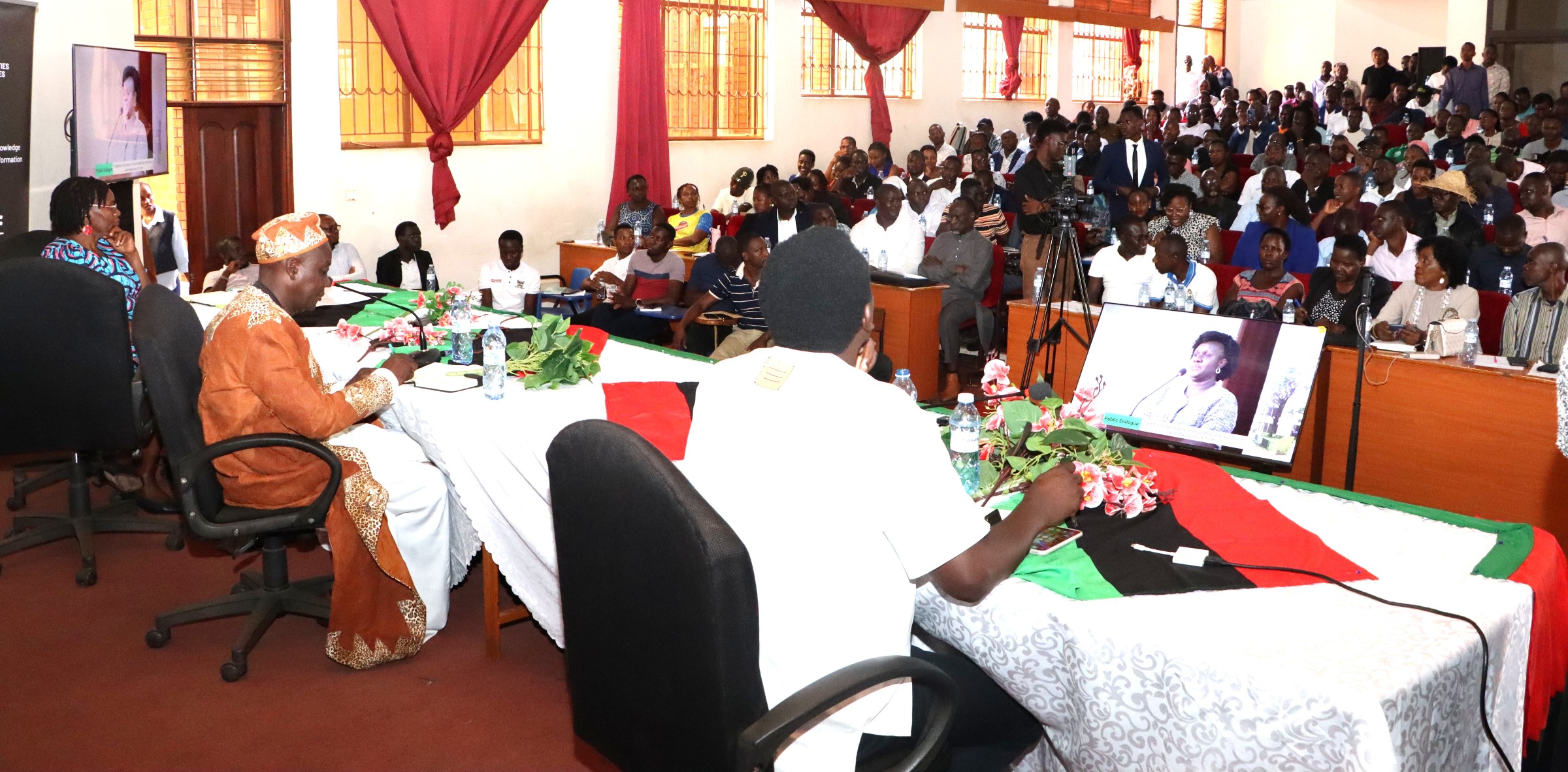
Kampala | Makerere University 29th April 2025
In one of the most intellectually provocative events in recent memory, over 2,000 participants—online and in person gathered at Makerere University on Tuesday for a historic public dialogue titled “Traditional Spirituality, Herbal Medicine, Witchcraft and Questions of Truth.” The forum, hosted by the College of Humanities and Social Sciences (CHUSS), drew academics, students, researchers, spiritual practitioners, and members of the public to explore issues often considered taboo in formal education.
By 2:00 pm, the College of Engineering, Design, Art and Technology’s Conference Hall was filled beyond capacity, forcing latecomers to seek alternative venues or follow the conversation through livestreams. Zoom was capped at 500 users before the official start, while over 1,000 more followed via YouTube. The dialogue extended into the evening, with audiences riveted for more than five hours.
Clash of Paradigms: Philosophy Meets Spiritual Practice
At the heart of the event were two divergent but deeply respected voices: Dr. Jimmy Spire Ssentongo, philosopher, ethicist, and renowned cartoonist, and Dr. Yahaya Hills Kagali Sekagya, a traditional spiritualist, herbalist, and trained dental surgeon with a PhD in Public Health. Sekagya also studied Law.
Decolonizing Knowledge and Defending Indigenous Science
Dr. Sekagya, Director of PROMETRA Uganda and a global voice in traditional medicine, provided a nuanced defense of African spirituality and indigenous healing practices. Moving fluently between biomedical terminology and metaphysical concepts, he highlighted the depth and legitimacy of knowledge embedded in African cosmologies.
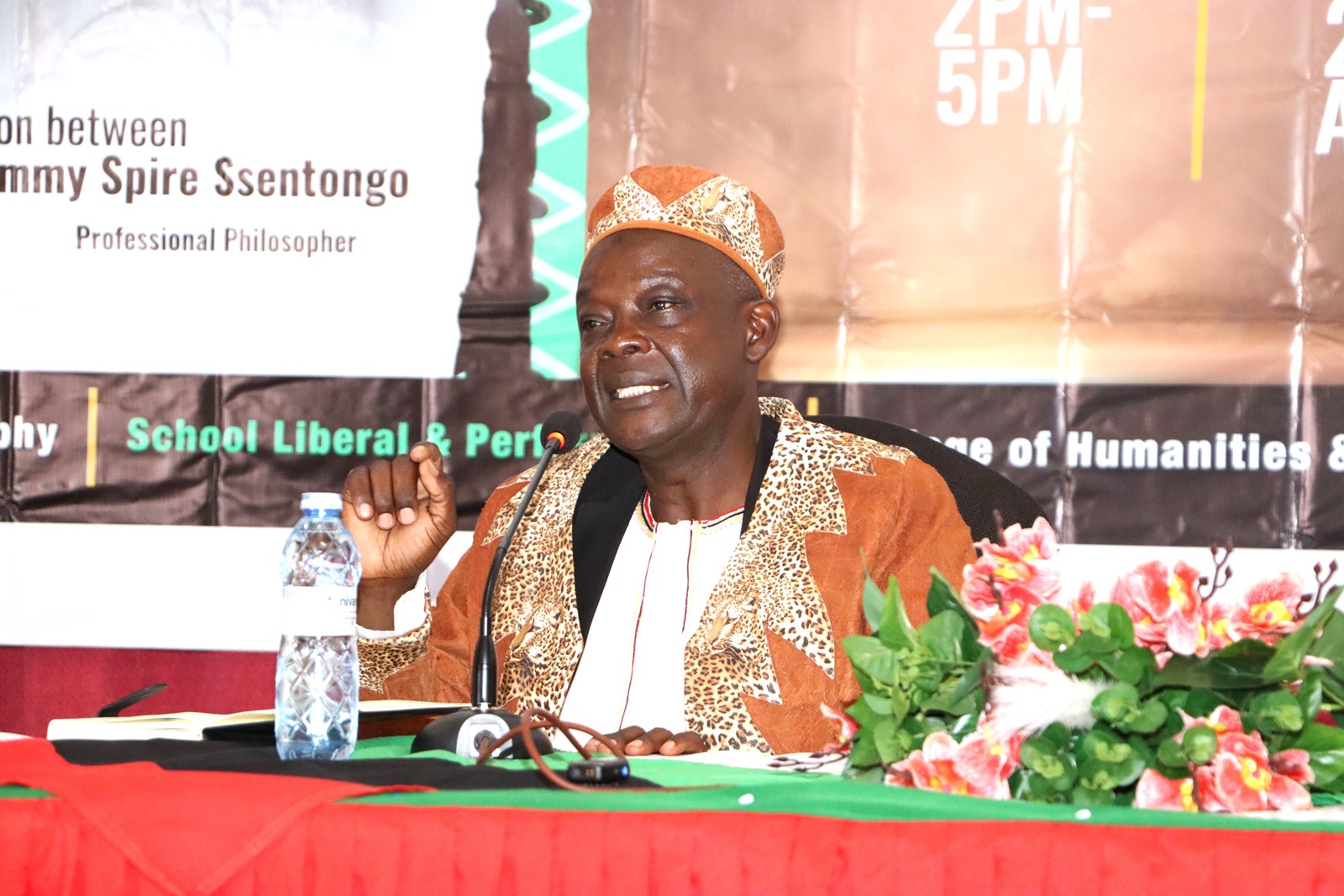
Although often judged by his appearance—he wore a spiritual robe during the event—his academic and medical credentials challenged stereotypes about traditional healers. Many who initially dismissed Sekagya as a “witch” based solely on his attire, were shocked upon hearing of his scientific training.
A Dialogue That Defied Boundaries
Their dialogue dissected the boundaries between indigenous healing systems, spiritual worldviews, modern science, and Western rationalism. The discussion traversed numerous academic and epistemological fields—philosophy, sociology, engineering, religion, psychology, and medicine—emphasizing that complex issues such as truth and healing cannot be understood through isolated disciplines. Both speakers called for an integrative approach to knowledge that includes the arts, humanities, and traditional sciences alongside STEM.
The key take away was that, “Knowledge is not confined to university departments. We need philosophy to understand medicine, and we need spirituality to understand psychology. The human experience is too complex for a single lens.”
Dr. Jimmy Spire Ssentongo: “The More You Know, the More Knowledge Humbles You”
Dr. Jimmy Spire Ssentongo delivered a powerful address on the necessity of openness, intellectual humility, and epistemic justice . He was gave the motivation behind hosting the public dialogue interrogating African spirituality, herbal medicine, and the boundaries of science.
Dr. Ssentongo opened with a moment of synchronicity involving the name “Augustine,” moving into a parable about Saint Augustine and the mystery of divine knowledge. He used this story to underline a key point: that human understanding is always partial, and that true wisdom begins with acknowledging how little we truly know.
“We always want to imagine that we know the world so well,” he said. “But we fail to acknowledge that the world is so complex. There are more things than we can ever know.”
Drawing from Socrates’ declaration—“I know that I don’t know”—Ssentongo urged fellow academics and participants to adopt a humble posture toward knowledge, rejecting the arrogance that comes with narrow-mindedness or disciplinary silos.
He addressed the backlash surrounding the event, including accusations of promoting witchcraft, with sharp critique and clarity:
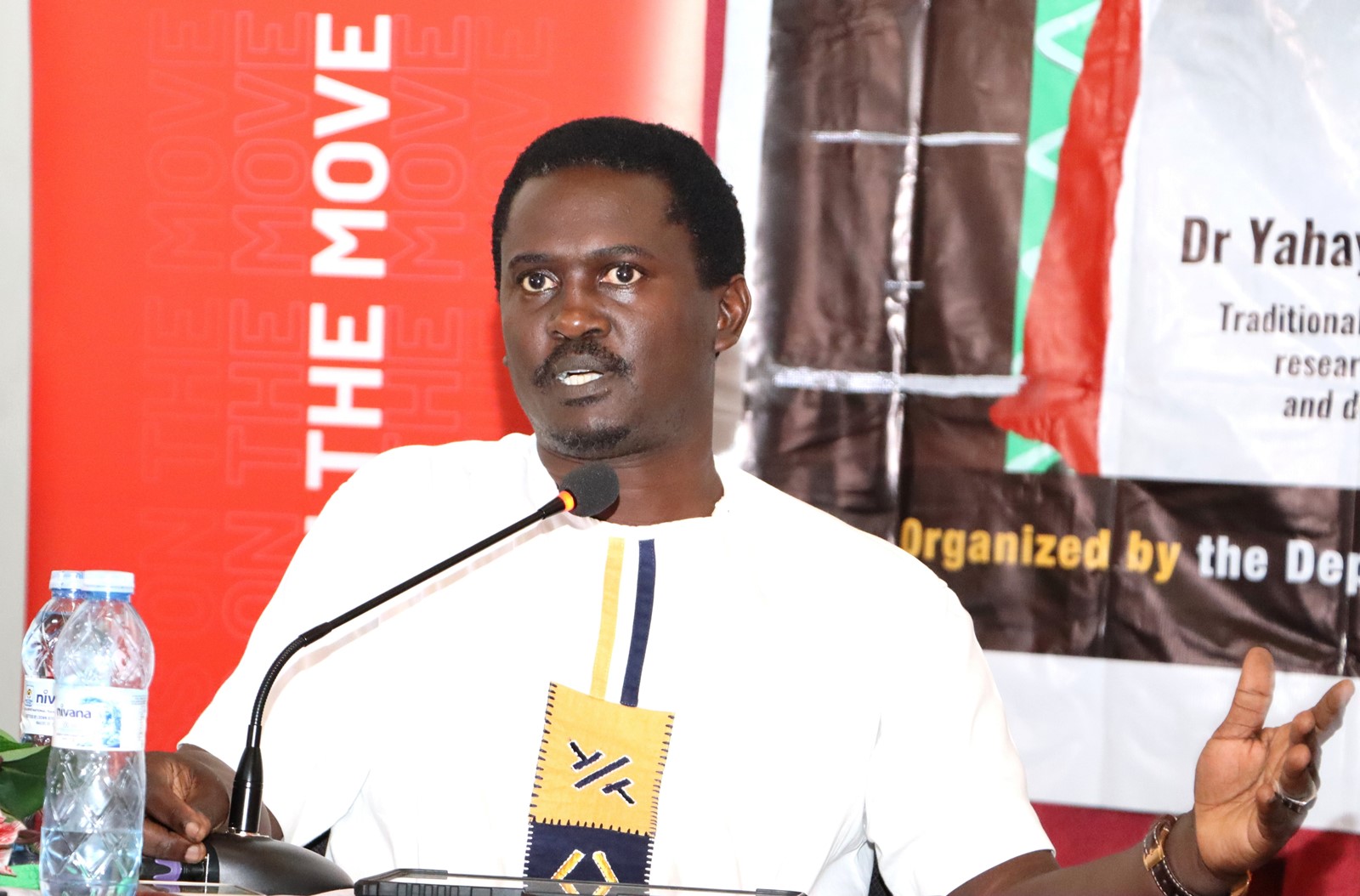
“You don’t have to agree with something to understand it… It’s our unwillingness to engage that empowers ignorance and exploitation—whether in herbal medicine or religion.”
Ssentongo challenged the binary thinking that dominates academia and social discourse, particularly how indigenous knowledge is marginalized through labels like “alternative medicine.”
“That language is not innocent,” he warned. “It has already created the main—the authentic—and the alternative. And we keep building these binaries which are very detrimental to understanding.”
He lamented the politics of knowledge production, pointing out that powerful interests from pharmaceutical companies to religious establishments often dictate what is recognized as legitimate knowledge, thereby stifling critical inquiry into African spiritual and healing practices.
In a moment of warmth and humility, Ssentongo lauded guest speaker Dr. Sekagya for his depth of knowledge and gracious composure, despite being prematurely judged based on appearance:
“We profile people based on what’s already in our minds. When you do that, you build a wall that blocks understanding.”
He closed with gratitude to the organizing teams, university leadership, and the patient audience, reminding all that the session’s six-hour length was testament to the power of curiosity, intellectual freedom, and dialogue.
“The more you know, the more knowledge humbles you,” he said. “And I love humble people—that’s the sign of true education.”
Principal Nkabala Applauds Groundbreaking Dialogue on Truth and Decolonisation
While closing the dialogue, Associate Professor Helen Nambalirwa Nkabala, Principal of the College of Humanities and Social Sciences (CHUSS), reflected on the boldness of the topic, Prof. Nkabala admitted initial concerns over whether enough publicity had been done for such a sensitive conversation. But her concerns quickly gave way to admiration for the depth and courage of the discussions.
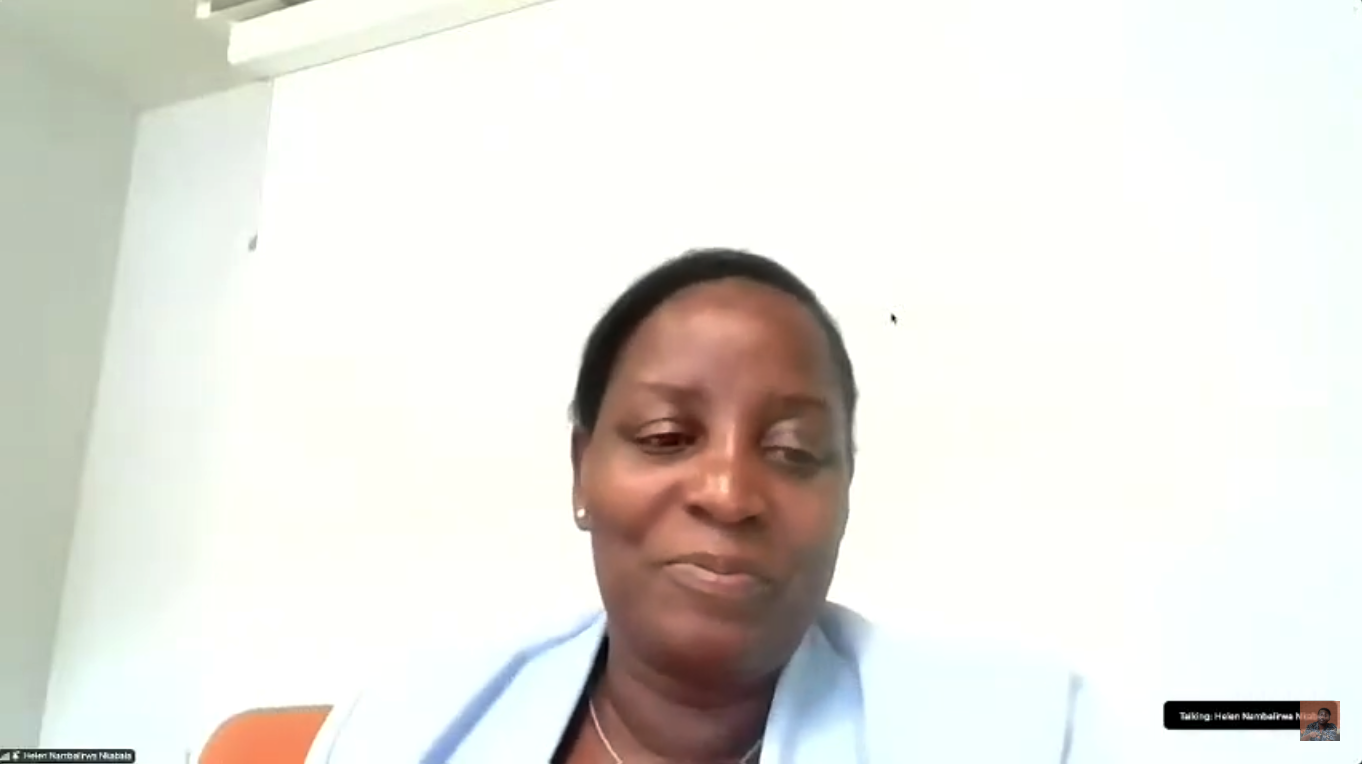
“This is the very reason the college exists,” she said. “We are not afraid of speaking about the things many are afraid to talk about.”
She praised the dialogue for achieving the core mission of the Humanities and Social Sciences: to broaden perspectives, enhance global awareness, and deepen our understanding of human behaviour. With confidence, she noted that all participants—whether in-person or online—had walked away transformed in their thinking.
Prof. Nkabala commended Dr. Sekagya for integrating science with cultural and spiritual frameworks, and Dr. Spire Sentongo for initiating a conversation that challenged binaries and inspired creativity. She mentioned emerging ideas such as “deep green spirituality” and renewed interest in electromagnetics, highlighting how the discussion had sparked innovation beyond the humanities.
“This shows that the conversation we have had has really inspired people—and they are becoming more innovative than they would have wanted,” she remarked.
With gratitude, she acknowledged the CHUSS team, Makerere University management and all participants. Her message was clear: this was not a one-off event, but a starting point in a series of transformative engagements.
“Just watch this space,” she said, promising more impactful dialogues to come.
She then invited Deputy Principal Assoc. Prof. Eric Awich Ochen to offer closing sentiments on behalf of the college, adding a “physical touch” to the collective appreciation for such a powerful and memorable gathering.
One of the Most Impactful Symposiums at Makerere: Deputy Principal Applauds Courageous Dialogue Bridging Humanities and Science
Using a metaphor from astrophysics, Prof. Awich likened human understanding to the work of space telescopes like Hubble, which, despite operating for decades, can only capture a fraction of the vast cosmos.
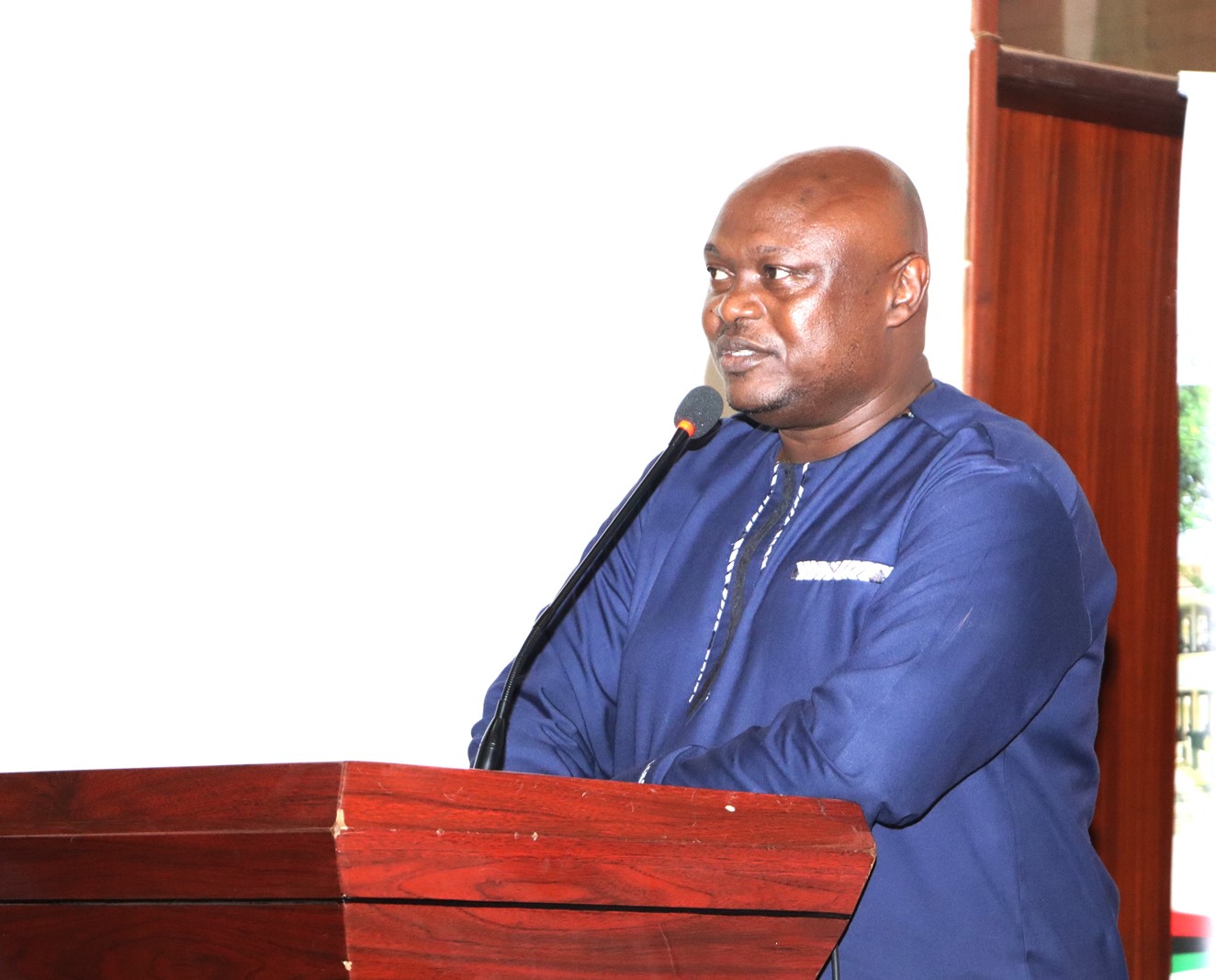
“Even what the telescope is showing us is less than 1% of what’s out there,” he remarked. “That tells you how little we know—and how much more there is to question, explore, and understand.”
He also offered warm praise to Dr. Sentongo, whose public image as a cartoonist and columnist is matched by a deeply intellectual and humble personal presence. Sentongo, he revealed, is preparing to exhibit new creative work that continues this exploration of truth and identity.
The deputy principal applauded the panelists and especially Dr. Christine Mbabazi Mpyangu, the symposium’s moderator from the Department of Religion and Peace Studies, for guiding the complex conversation with clarity and balance. He described her selection as the “best choice that could ever happen for this symposium.”
Prof. Awich also emphasized how the themes of the day—truth, spirituality, medicine, and the decolonisation of knowledge—are not merely academic curiosities but essential areas of inquiry for understanding African identity, history, and global positioning.
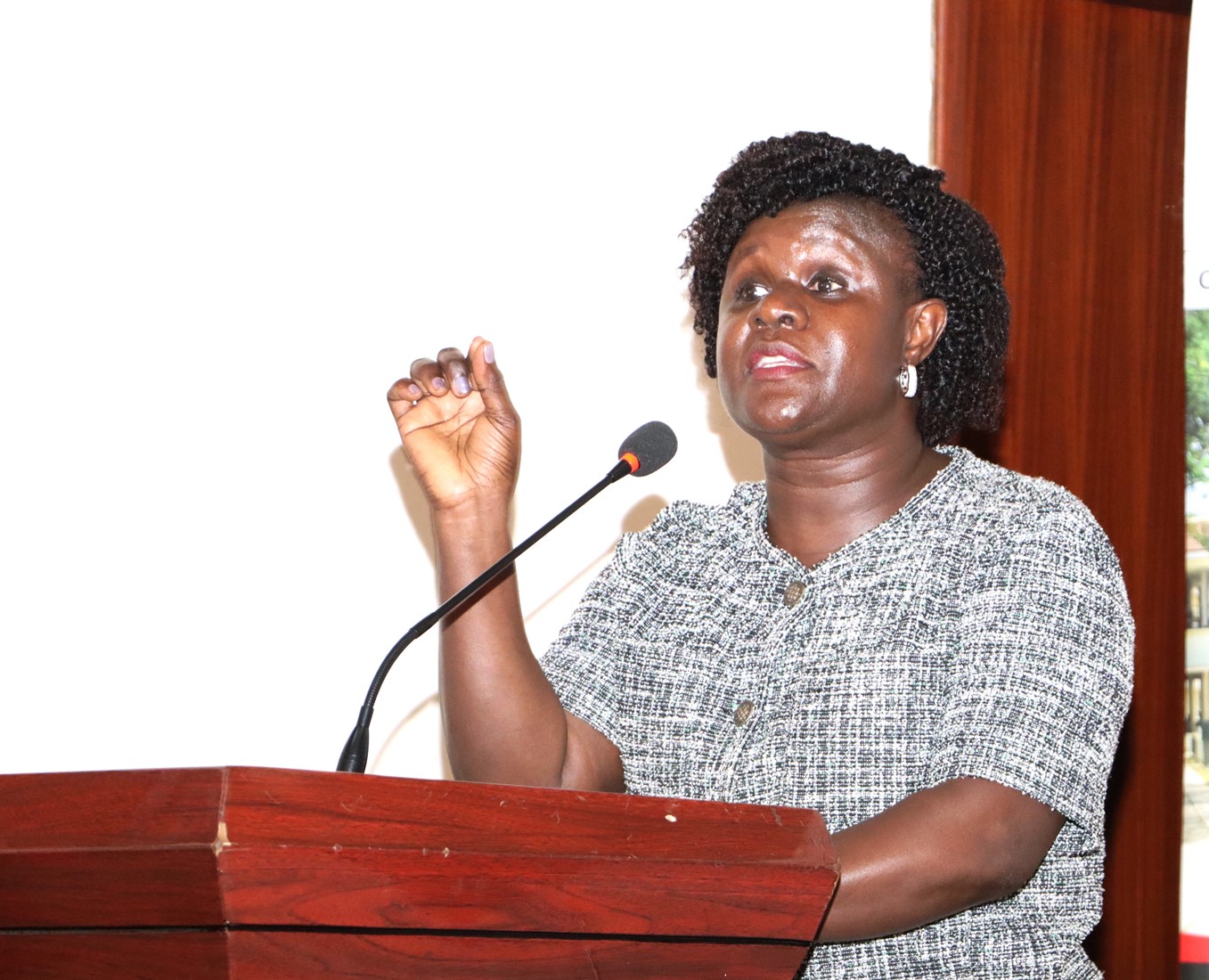
“This is very good for our students,” he said. “It’s humbling, and it’s intellectually nourishing. I have been deeply moved and educated by this dialogue.”
He closed by inviting all participants to “watch this space” for future dialogues that will continue to push intellectual boundaries and make CHUSS a cornerstone of Makerere’s global thought leadership.
“Thank you again for coming. Whether you were here physically or joined us online, we are grateful. And I promise, this is just the beginning.”
A Bold Dialogue on Truth, Decolonisation, and African Knowledge Systems
Dr. Pamela Khanakwa, Dean of the School of Liberal and Performing Arts at Makerere University, called on scholars, students, and the wider public to embrace African epistemologies, challenge colonial legacies, and confront entrenched biases in the understanding of truth and science.
“Why should we fear these conversations?” Dr. Khanakwa asked. “Our dialogue today seeks to interrogate the little understood and often blurred lines between traditional African spirituality, herbal medicine, and witchcraft.”
The she said formed part of Makerere‘s broader initiative to decolonise education and expand the frontiers of knowledge by re-examining the role and validity of indigenous African practices in modern society and a reclamation of African intellectual space
Khanakwa’s address was not merely ceremonial; it was a scholarly critique of how colonial regimes distorted African worldviews and knowledge systems, relegating them to the margins of legitimacy.
“What was African—our indigenous knowledge—was labelled barbaric, primitive, demonic, evil,” she said. “Meanwhile, Western belief systems, especially biomedicine, were centralized as the standard of progress and truth.”
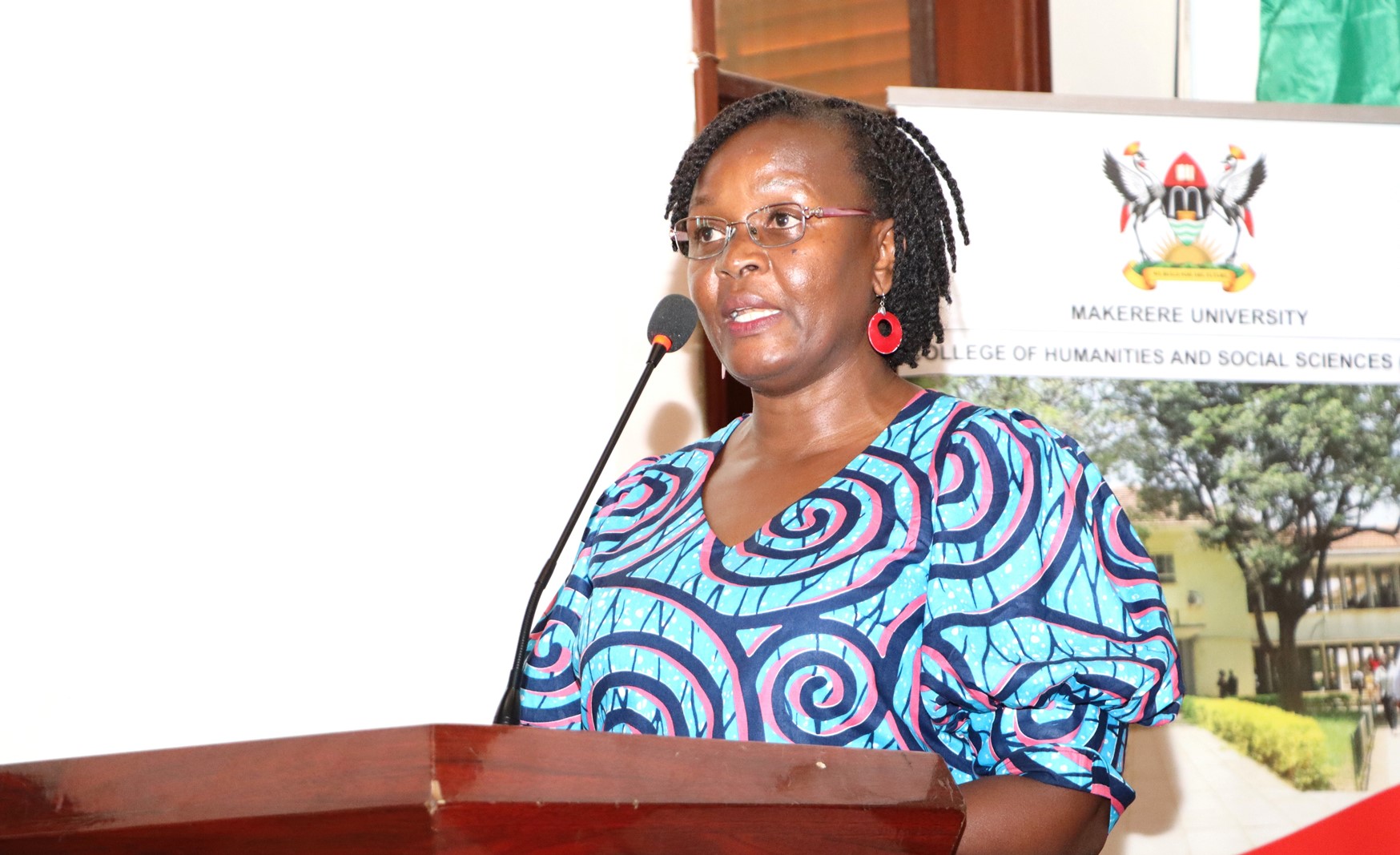
She pointed to laws like Uganda’s Witchcraft Act of 1957 and Zimbabwe’s Witchcraft Suppression Act of 1899 as colonial tools used to criminalize African religious and healing practices, reinforcing the hierarchy between Western science and African spirituality.
These laws, she noted, continue to influence public policy and education, often excluding or diminishing traditional healing and metaphysical systems that millions on the continent continue to rely on.
Blurring the Line Between Science and Spirituality
Dr. Khanakwa challenged the false dichotomy between science and non-science, noting that many African healing practices dismissed as superstition may simply be sciences that remain understudied or misunderstood.
“How about if what we consider witchcraft is actually science which has not yet been unlocked?” she asked, raising the example of traditional bone-setters who reportedly mend fractures remotely—an observation met with nods and murmurs of agreement from the audience.
She also referenced the lingering stigma within academic institutions, sharing a conversation with a colleague in veterinary sciences who was wary of interacting with social scientists because of perceived connections to witchcraft.
“This fear and ridicule are rooted not in reason, but in the colonial devaluation of African knowledge,” Khanakwa explained and called for critical appraisal, not blind reverence.
While deeply rooted in the cultural reclamation agenda, Khanakwa emphasized that the event was not a platform for blind celebration of all traditional practices. Rather, it was a space for critical epistemic appraisal—an honest, analytical exploration of what constitutes truth, and who gets to define it.
“We are not just here to romanticize indigenous knowledge,” she said. “We are here to examine it rigorously, question the boundaries, and reclaim intellectual agency.”
She framed the dialogue as both an academic and civic responsibility, rooted in the liberal arts tradition of open-minded inquiry and debate- a knowledge without borders
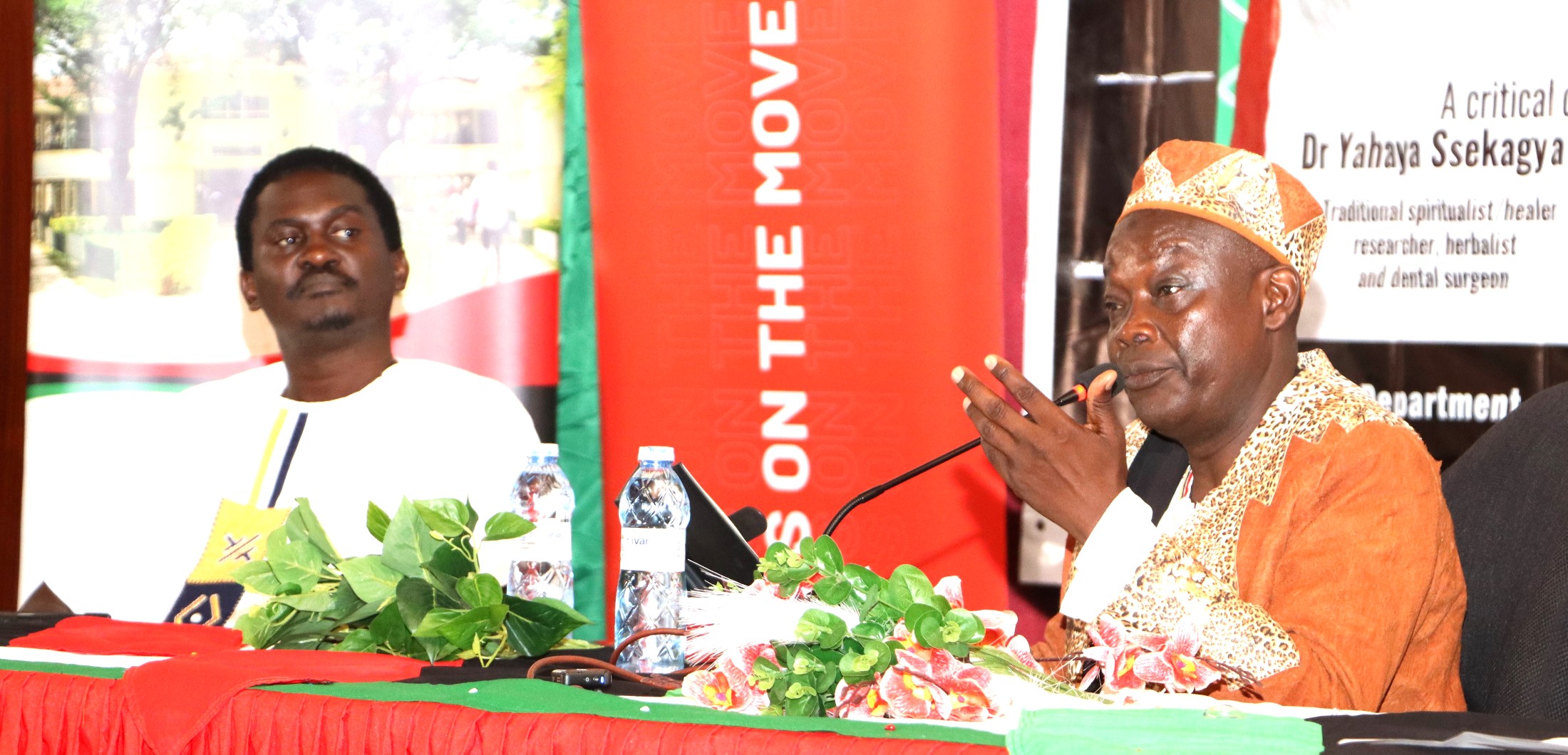
In a nod to African communalism, Dr. Khanakwa closed her remarks with an invitation to inclusivity and collective growth:
“In an African house, there is always space for one more. You cannot lock someone out in the rain because you say the house is full.”
The spirit of intellectual hospitality, she argued, must extend to epistemological spaces—where truth is not confined to laboratories or lecture halls in the Global North, but also resides in shrines, herbs, rituals, and oral traditions passed down through generations.
As she welcomed the day’s speakers, Khanakwa reiterated Makerere University’s commitment to being more than an academic institution: a site of African self-discovery, healing, and intellectual sovereignty.
Questioning the Scientific Method and Medical Colonialism
Dickson Kanakulya, Head of the Department of Philosophy at Makerere University, issued a critique of society’s fear of “uncomfortable knowledge” and positioned Makerere as a courageous leader in pushing intellectual frontiers that others fear to approach.
“Makerere is not fearful to explore all aspects of knowledge,” Dr. Kanakulya declared. “That is what has made this institution great—we ask the questions that others are afraid to ask.”
The event—attended by over 2,000 people both in-person and online—was part of a growing series of intellectual forums led by the College of Humanities and Social Sciences (CHUSS) that challenge conventional paradigms of science, truth, and African knowledge systems.
Dr. Kanakulya used the platform to interrogate the longstanding hierarchies that have historically labeled indigenous knowledge as superstition or witchcraft. He drew attention to how rituals, symbols, and metaphysical practices in African traditions have been ridiculed, while similar elements in Western religious and scientific institutions are normalized or revered.
“Why is it that when a Pope wears red or conducts elaborate rituals, it’s considered sacred—but when an African elder wears a leopard skin, it’s ‘witchcraft’?” he asked. “What is the psychoanalytic message behind those colors, garments, and rituals?”
Referencing comparative burial rituals—from Vatican ceremonies to the traditional burial of a Omutaka wrapped in over 200 barkclothes—he questioned the global double standards that determine which practices are called ‘holy’ and which are dismissed as irrational.
“We are not just asking religious questions—we are asking epistemological questions: who defines what knowledge is, and who gets excluded?”
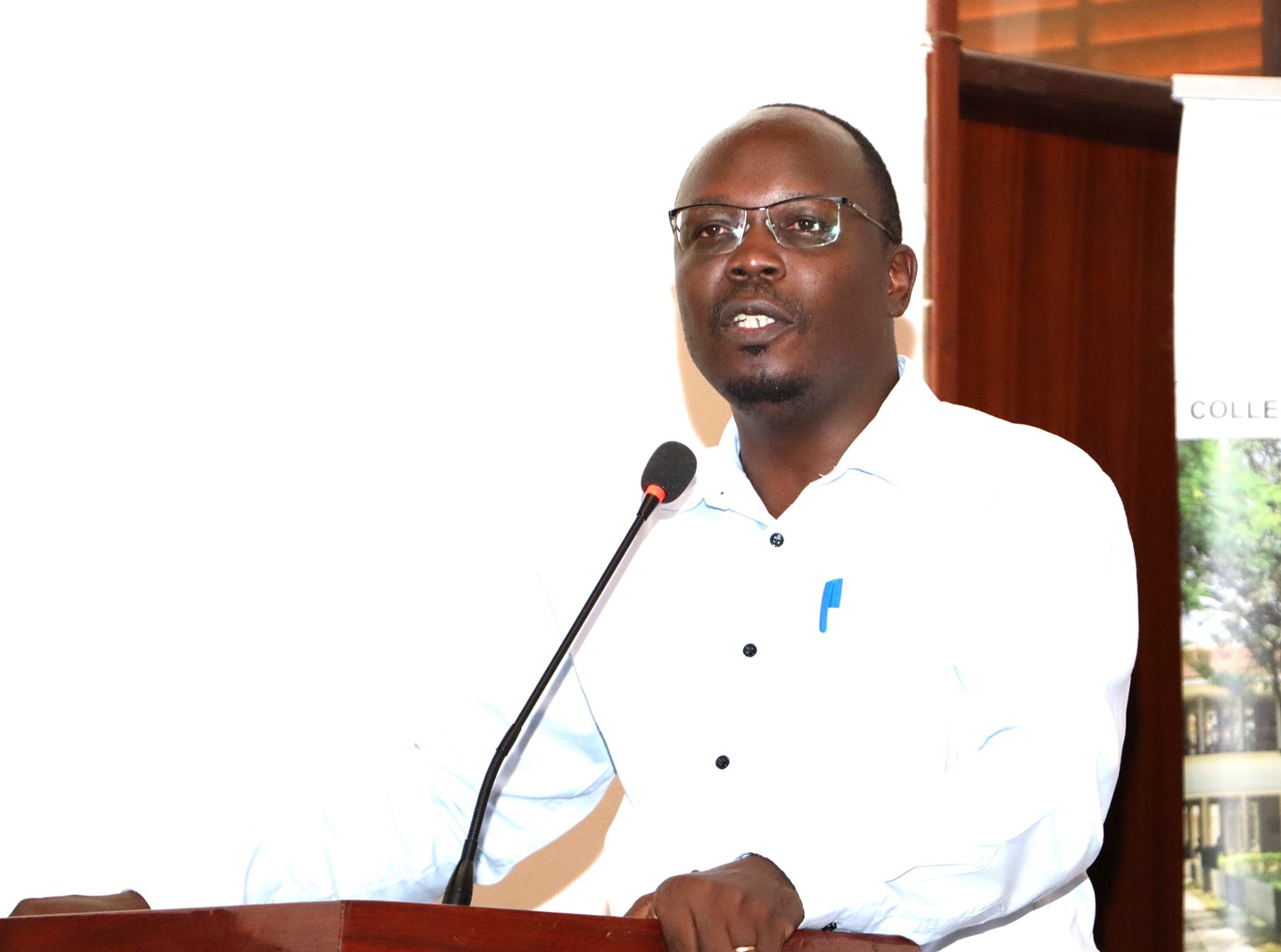
Perhaps most provocatively, Dr. Kanakulya challenged blind reliance on what he called the “so-called scientific method,” especially in light of the global COVID-19 pandemic.
“COVID-19 raised a very serious question: does the scientific method work?” he asked. “When the pandemic struck, even our most decorated scientists ran and hid. Vaccines were promised, but not available. And yet, African herbal knowledge—like Professor Ogwang’s COVIDEX—saved lives.”
He praised Ogwang’s use of traditional medicinal knowledge passed down by his mother to develop a treatment that gained national certification and public trust during the health crisis, even while being initially discouraged by the scientific establishment.
Kanakulya described this contradiction as “medical colonialism”—a phenomenon where Western institutions continue to control narratives around health, healing, and legitimacy, despite relying on indigenous knowledge for drug development.
“Over 60% of pharmaceutical drugs have roots in traditional herbal medicine. Yet we are told the version made in the lab is superior to the one made by God. Why?”
Echoing themes from thinkers like Descartes, Richard Rorty, and Albert Einstein, Dr. Kanakulya urged attendees to reconsider the very nature of knowledge and reality. He connected traditional African metaphysics to emerging fields like quantum physics, highlighting how both challenge fixed notions of objectivity and material reality.
“Traditional African science believes that molecules and cells are constantly absorbing information—through light, sound, and energy. That’s what quantum mechanics now confirms,” he explained. “When elders say a stone remembers what happened, and science says DNA remains at crime scenes, are we not talking about the same phenomenon through different lenses?”
He raised challenging philosophical comparisons: summoning a person’s spirit in a water basin vs. seeing their face on a smartphone screen. Both, he argued, deal with unseen connections and transmissions of information. So, which one is called witchcraft—and why?
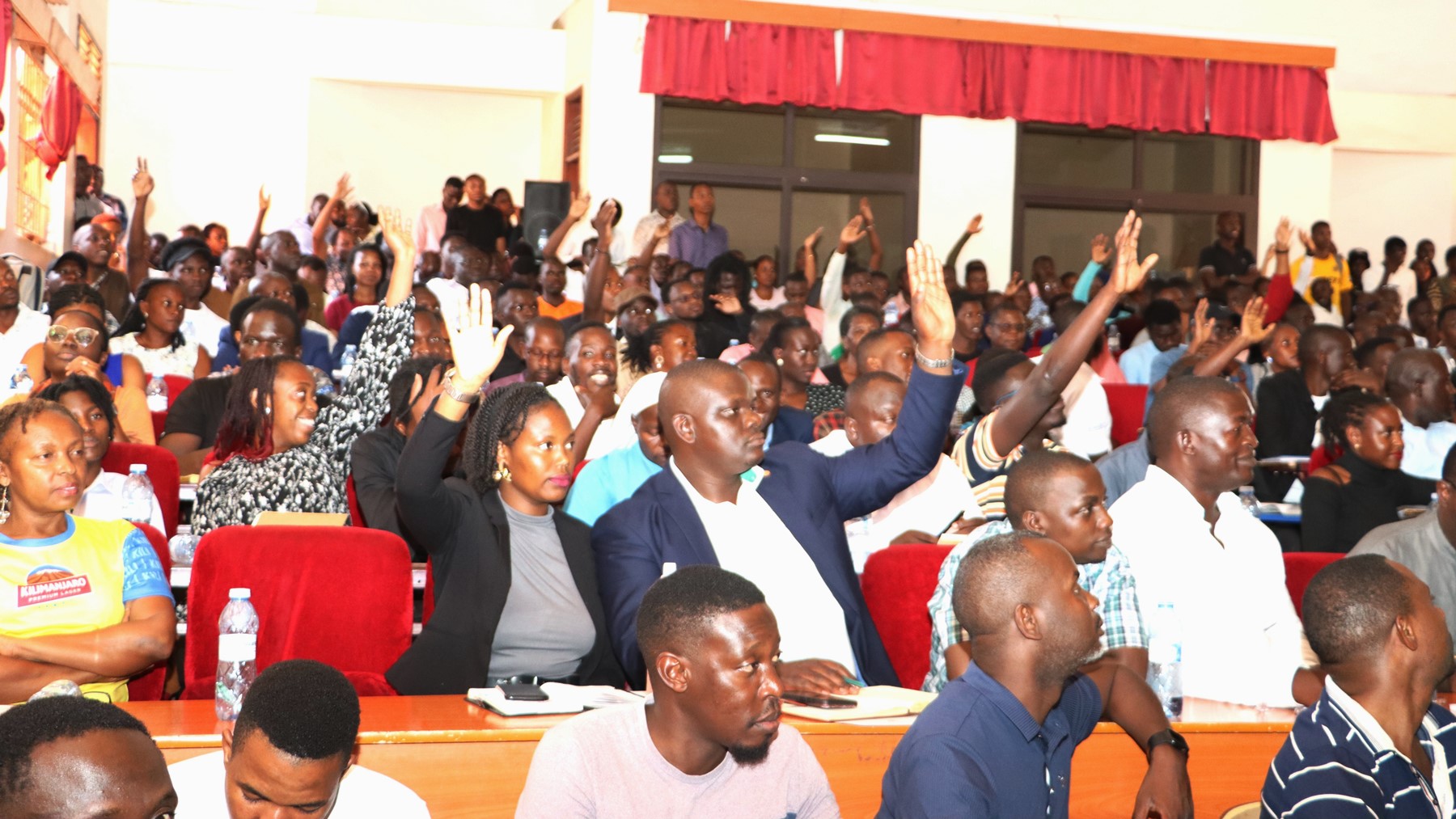
“The question of witchcraft is a question of epistemology. It’s not just a cultural issue; it’s about how we define reality and truth. It is time to decolonize those definitions.”
Kanakulya also connected philosophical inquiry to policy questions, especially the right to health in African constitutions. He noted that 80% of Africans rely on traditional medicine, yet it remains underfunded, un researched, and stigmatized.
“If the right to health is a human right, then herbal medicine must be mainstreamed,” he said. “We cannot continue to rely on knowledge produced in Western laboratories when we have solutions rooted in our own environment and history.”
Citing rising rates of non-communicable diseases among Africans under 30, he warned that Africa’s future is being shaped by pharmaceutical industries and researchers who are not accountable to local communities.
“They have our DNA in labs. They are designing drugs for African genes. That is medical colonialism. And you think you are free because you raise a flag on Independence Day?”
Dr. Kanakulya concluded with a call to embrace philosophy as a tool for critical inquiry and emancipation.
“Philosophy asks the uncomfortable questions. Are you in love or are you dreaming? Are you alive or are you merely existing under illusions passed down to you?”
He urged the academic community to take seriously African forms of knowledge—including metaphysical and spiritual practices—and to move beyond outdated colonial binaries of science vs. superstition.
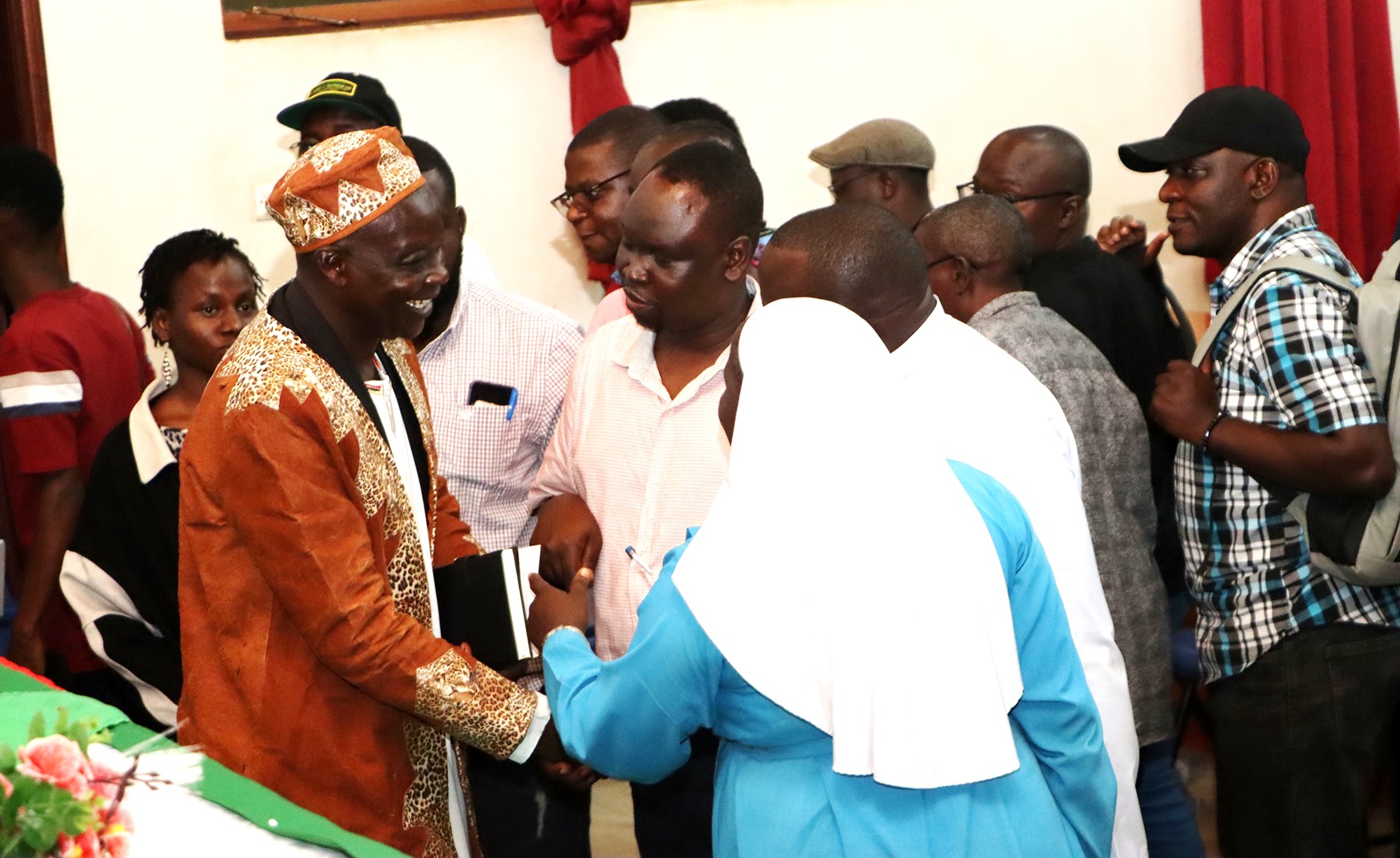
“Witchcraft is not just in shrines. It’s in churches, markets, and technology. The real question is not whether it exists—but how we understand it, and what truths we are afraid to see.”
The remarks set a powerful tone for the evening’s dialogue and reinforced the role of the Department of Philosophy as a leading voice in deconstructing knowledge hierarchies at one of Africa’s oldest universities.
Looking Forward
The event has sparked interest in more dialogues exploring spirituality, healing, and knowledge systems. Students and staff reportedly requested future sessions, including modules on electromagnetics in traditional healing and “deep green spirituality.”
As the sun set on Makerere Hill, the session ended not with closure, but with a challenge—one issued implicitly by every speaker and participant: to keep questioning, keep listening, and to rediscover the wisdom that centuries of erasure have tried to silence.
You can access the Public Dialogue, “Traditional Spirituality, Herbal Medicine, Witchcraft and Questions of Truth “ on YouTube Video embedded below.
Jane Anyango is the Communication Officer CHUSS
You may like
-


CAES Presents Overall Best Performing Student in the Sciences & a Record 28 PhDs at the 76th Graduation Ceremony
-


Philliph Acaye and the Making of Uganda’s Environmental Health Workforce
-


76th Graduation Highlights
-


Mak hosts First African Symposium on Natural Capital Accounting and Climate-Sensitive Macroeconomic Modelling
-


Strengthening Global Partnerships to Advance Research, Innovation, and Graduate Training: Makerere University Hosts Delegation from the University of Warwick
-


Olivia Nakisita and the Quiet Urgency of Adolescent Refugee Health
Humanities & Social Sciences
Meet Najjuka Whitney, The Girl Who Missed Law and Found Her Voice
Published
5 days agoon
February 23, 2026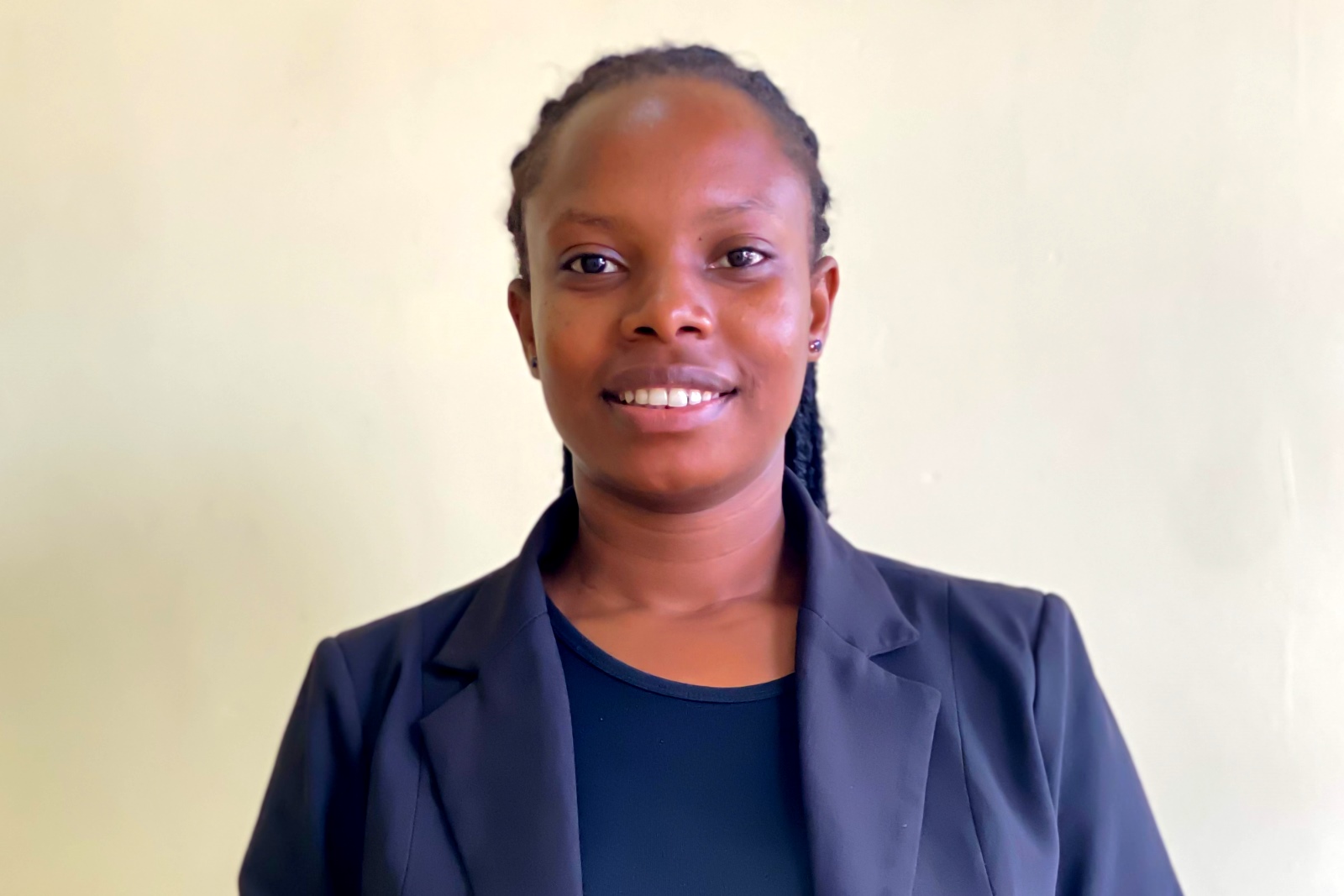
On the morning of Friday, February 27, when the academic procession winds its way across Makerere University’s Freedom Square for the last day of the 76th Graduation Ceremony, Whitney Najjuka will walk into history with a number beside her name: 4.46.
At Makerere, that number means First Class Honours. It means the Vice Chancellor’s List. It means she graduates as the only First-Class student in Journalism and Communication this year. But numbers, as Whitney has learned, rarely tell the full story.
Born on March 27, 2002, in Nabbingo, Kyengera Town Council, to Margaret Kusemererwa and Fred Kasirye, dreamt she would do Law, one of the disciplines, prestigious, almost inevitable next steps for a student who had excelled in secondary school. She had done everything correctly. Studied hard. Scored well. Followed the script.
But Makerere University had other plans. She missed the pre-entry mark, but found her name under Journalism and Communication, another prestigious course offered by the Journalism and Communication Department at Makerere University.
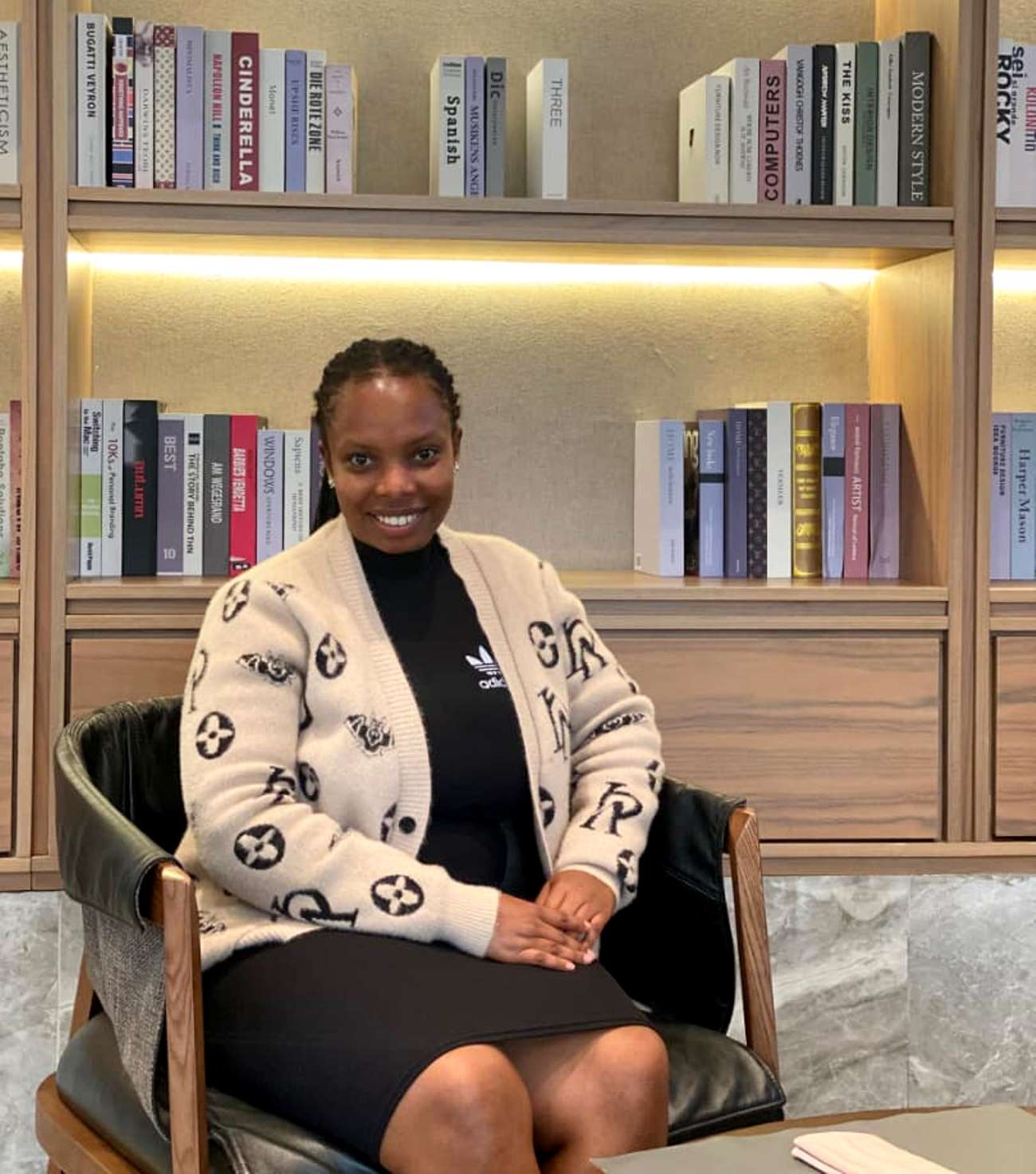
Najjuka began her academic journey at Muto Primary School in Buwama, earning 8 aggregates in the Primary Leaving Examination, a performance that positioned her strongly for secondary school.
She would later join St. Lucia Hill School, Namagoma, where she earned 20 aggregates at O-Level and 17 points in History, Luganda, and Divinity at A-Level.
Missing her dream course, Law, felt at first, like a detour. But Whitney was encouraged by Sanyu Christopher, her uncle, and she settled for a government-sponsored slot in the Bachelor of Journalism and Communication at Makerere, which she had applied for before.
She entered uncertain. But she graduates transformed.
The Pivot That Became a Purpose
Whitney speaks of her early university days with candor. She did not arrive at the Department of Journalism and Communication with a burning childhood ambition to be a journalist, but because another door had closed.
Then, Social and Behavior Change Communication happened. Applied Strategic Communication happened. She began to see media not as headlines and microphones, but as architecture, shaping how societies think, argue, and act.
The turning point came in her third year. The Female Journalist Foundation published her story on Sexual Gender-Based Violence (SGBV) and its emotional toll on survivors. What startled her was not its publication but the reaction. Comments flooded in. Debates ignited, especially about the role of men in combating GBV.
“I realized media doesn’t just report,” she says. “It frames how society views a crisis.”
Her voice, once tentative, had entered a national conversation.
The Discipline Behind 4.46
At Makerere University, a First Class CGPA is not built on brilliance alone but on ritual.
Whitney’s ritual began with showing up, on time, every time. She treated lectures as appointments with her future self. She refused to confine her learning to the syllabus. While attending workshops at the Aga Khan Graduate School of Media and Communication and obtaining external certifications, she sought and was open to mentorship through the Public Relations Association of Uganda (PRAU).
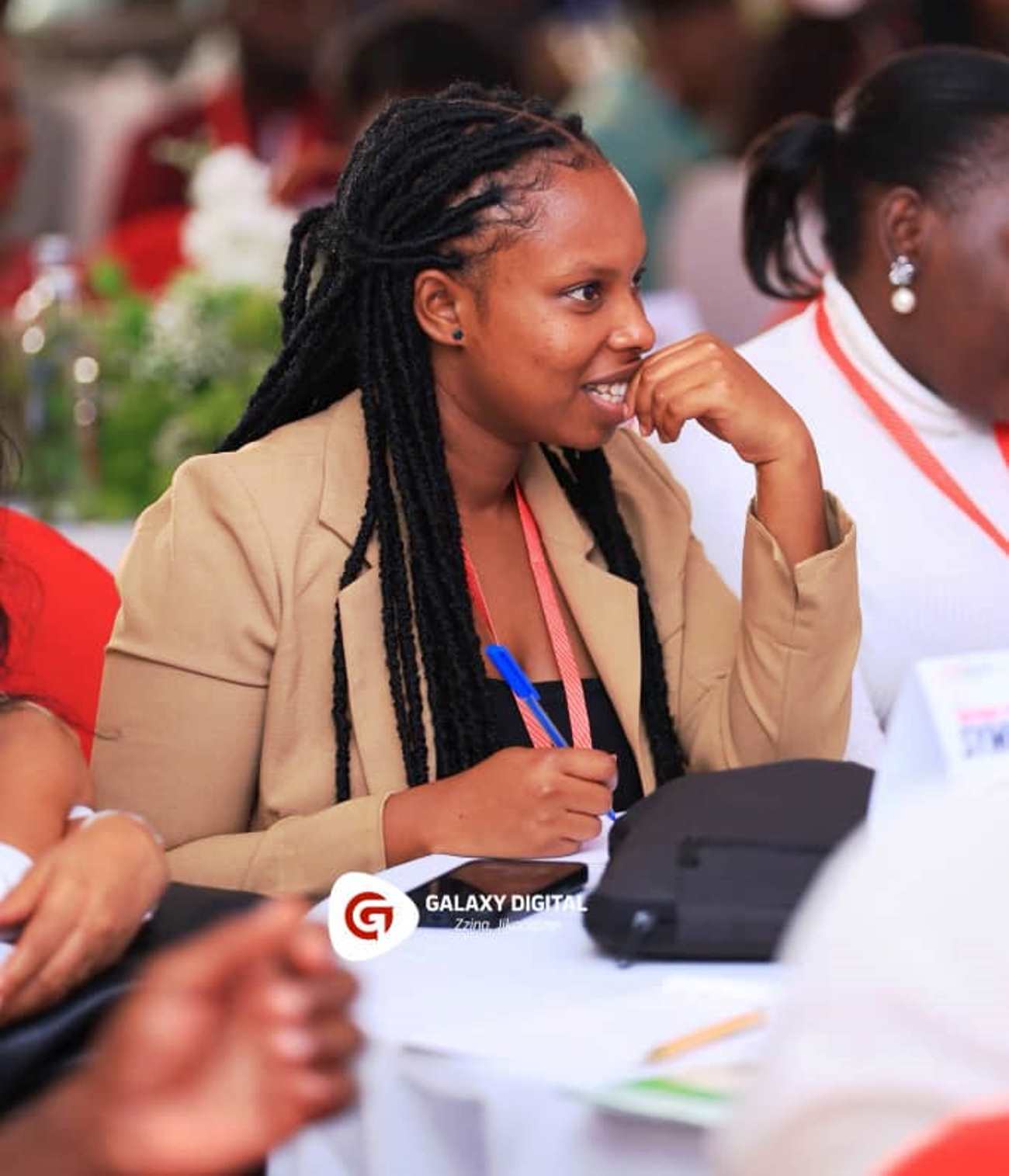
She wanted theory anchored in practice. And then there was the commute.
From Nabbingo, a hill in Wakiso District, some 18.6 km to Kampala, where the Makerere Main campus is situated, and back, nearly 20 hours a week dissolved into Kampala traffic. Two-hour journeys before 8:00 a.m. lectures. Dust. Noise. Headaches. She learned to manage energy the way others manage time. Fatigue became a tutor in resilience.
“I had to be intentional with every remaining hour,” she says. “Excuses were not an option.”
Learning to Practice Communication
If classrooms taught her analysis, presentations taught her courage. Pitching projects, defending research, and standing before peers quick to critique forced her to think on her feet. She was no longer simply studying communication; she was practicing it.
In 2024, the AGMES Fellowship at the Aga Khan Graduate School of Media and Communication pushed her further. She received funding to produce a capstone project on the mental impact of gender-based violence on survivors. She identified sources, conducted interviews, handled trauma with care, and worked with professional editors.
The Communication, she learned, is logistics and ethics as much as eloquence.
The Future She Sees
Whitney is optimistic about Uganda’s media landscape. The digital shift, she believes, has democratized influence. Young communicators are no longer confined to legacy newsrooms or offices.
Yet she sees a gap in the absence of structured research on sustainable, ethical, profitable independent media ventures in Uganda. Her ambition is not only to practice communication, but to study it. To produce data-backed frameworks that help young Ugandans transition from graduates to media entrepreneurs.
She wants to make the impact scalable.
What Remains
As the only First-Class graduate in her cohort, she is careful not to mythologize herself. “Success isn’t brilliance alone,” she says. “It’s a daily commitment when nobody is watching.”
Even before graduation, Whitney had stepped into the industry through a mentorship internship at Capital One Group (COG EA Ltd), a strategic marketing communications agency operating across East Africa.
At Capital One Group, we spoke to Paul Mwirigi Muriungi, the Managing Director and Head of Strategy, who spoke of Najjuka as a progressive and intentional young professional who approaches her work with curiosity, maturity, and responsibility.
“Her attitude is exemplary. She is teachable, receptive to feedback, and eager to grow. While technical skills can be taught, character, work ethic, and mindset determine long-term success, qualities that Whitney consistently demonstrates. Given her academic excellence and professional application, we believe she has a bright future both at Capital One Group and within the wider communications industry. She represents the kind of talent the profession needs: thoughtful, adaptable, and committed to excellence.
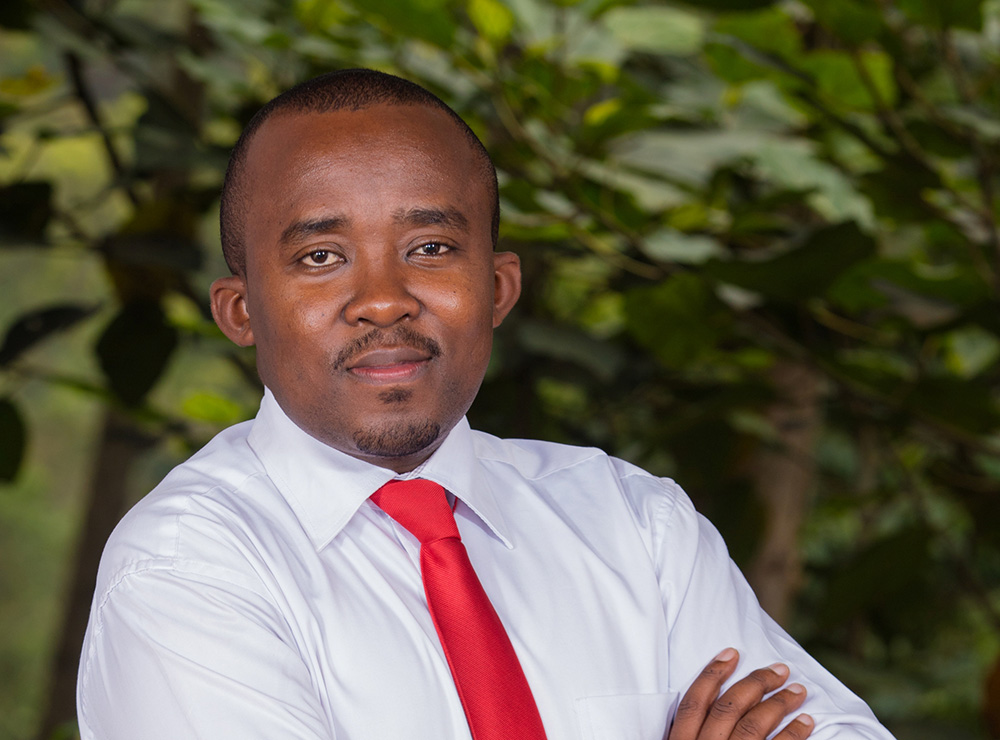
“We look forward to seeing her next chapter unfold,” says Mwirigi.
Najjuka’s gaze extends beyond her own trajectory. She speaks of what the Department could become. Furnished and equipped with industry-standard equipment, newsroom simulations, and deeper investment in data journalism as prayers. Her excellence is not self-congratulatory, but it is forward-looking.
“The University should support the Department to procure industry-standard equipment. Access to high-quality cameras, sound booths, and updated editing software like Adobe Creative Suite is critical to our learning environment,” she says.
Adding that, “We need a newsroom simulation, a physical or digital space where students work under real-time deadlines to produce content for the public. That would prepare us for industry and even strengthen the University’s own media platforms.”
In an era defined by metrics, algorithms, and digital traceability, data journalism is no longer a niche skill but a sine qua non of credible reporting. “There should also be more focus on data journalism and search engine optimization. These are no longer optional skills. Students would benefit immensely from stronger training in these areas.”
Dr. Aisha Nakiwala, the Head, Department of Journalism and Communication, says the faculty are very proud that she is graduating with a First Class—the only one in this year’s cohort.
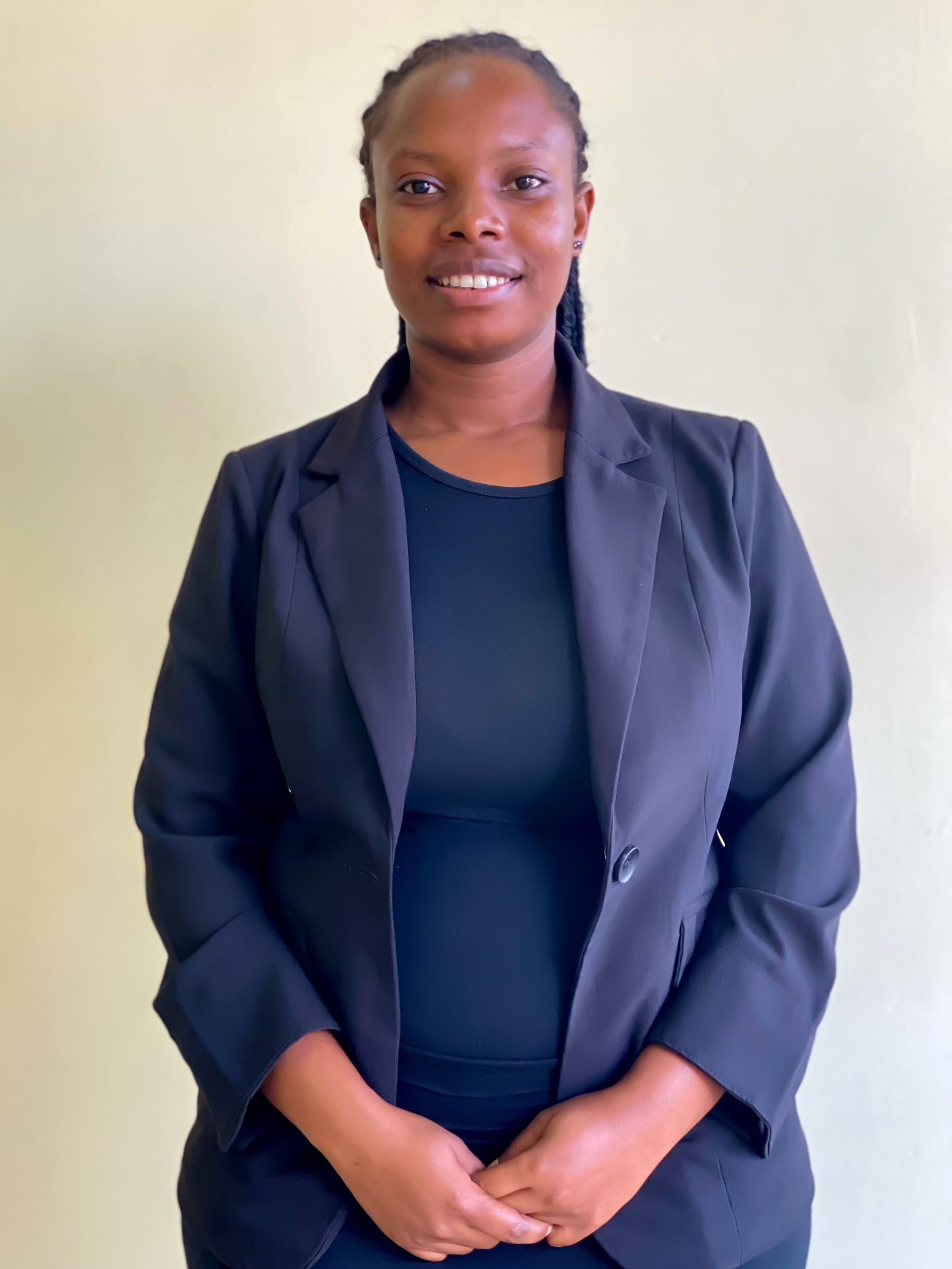
“This achievement reflects not only exceptional intellectual ability but also discipline, resilience, and sustained dedication to the highest standards over four years. Graduating with first-class honors is no small feat; it requires consistent outstanding performance.
“Her accomplishment sets a powerful example for continuing students and reaffirms our department’s commitment to nurturing excellence. We are confident she will make meaningful contributions to the communication profession and society at large,” says Dr. Nakiwala.
On graduation day, applause will crest and recede. The gowns will fold back into wardrobes. The transcripts will be filed away in cabinets. But something quieter will endure; a young woman from Nabbingo who once missed her Law mark, who spent 20 hours a week on the road, who discovered that storytelling is power, and who now walks into Freedom Square not by accident, but by intention.
Life, as she has come to understand it, lives on.
Humanities & Social Sciences
Dr. Pamela Khanakwa Honored for Steering Record 18 PhD Candidates for the Mak 2026 Graduation
Published
1 month agoon
January 23, 2026By
Jane Anyango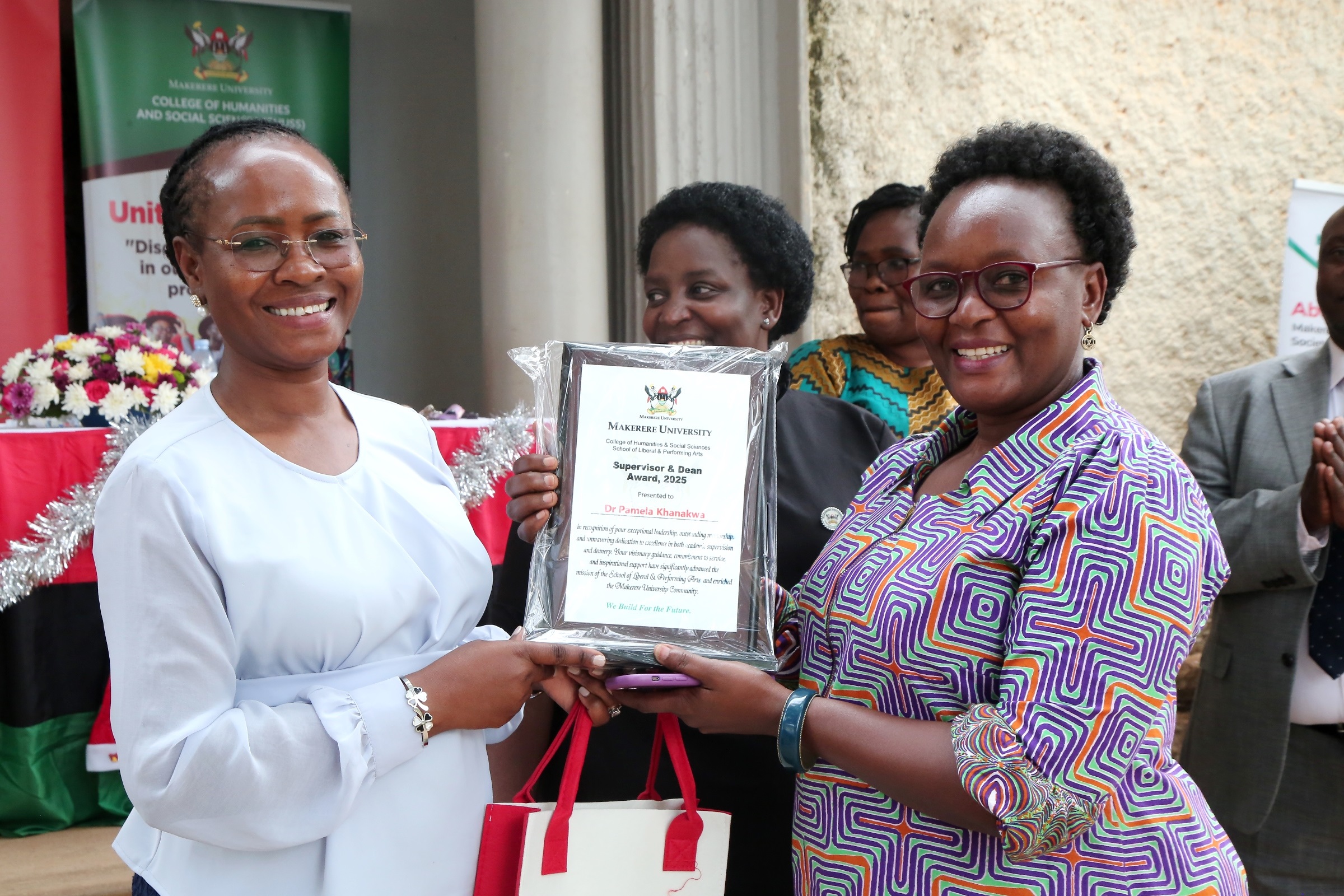
Six personally supervised, three completed in record time, as School of Liberal and Performing Arts sets a historic milestone. Dr. Pamela Khanakwa got the Award as Best PhD Supervisor and Dean
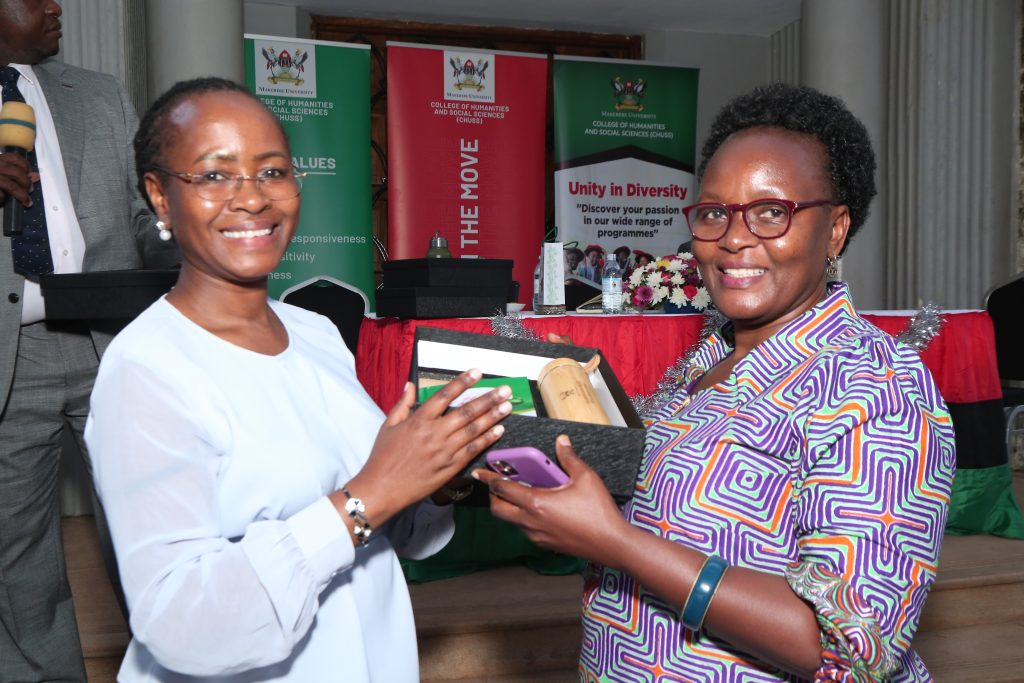
A Historic Academic Milestone for SLPA
The College of Humanities and Social Sciences (CHUSS) recognised the Dean of the School of Liberal and Performing Arts (SLPA), Dr. Pamela Khanakwa, for outstanding academic leadership that has seen the School field 18 PhD candidates for the next 2026 Makerere University Graduation Ceremony scheduled for 24th-27th February. Remarkably, six of these doctoral graduates were directly supervised by Dr. Khanakwa, with three completing within the official three-year timeframe, an exceptional achievement in graduate training. The recognition was announced during the CHUSS End-of-Year Get-Together, where staff applauded Dr. Khanakwa’s dedication, humility, and relentless commitment to postgraduate supervision and timely completion.
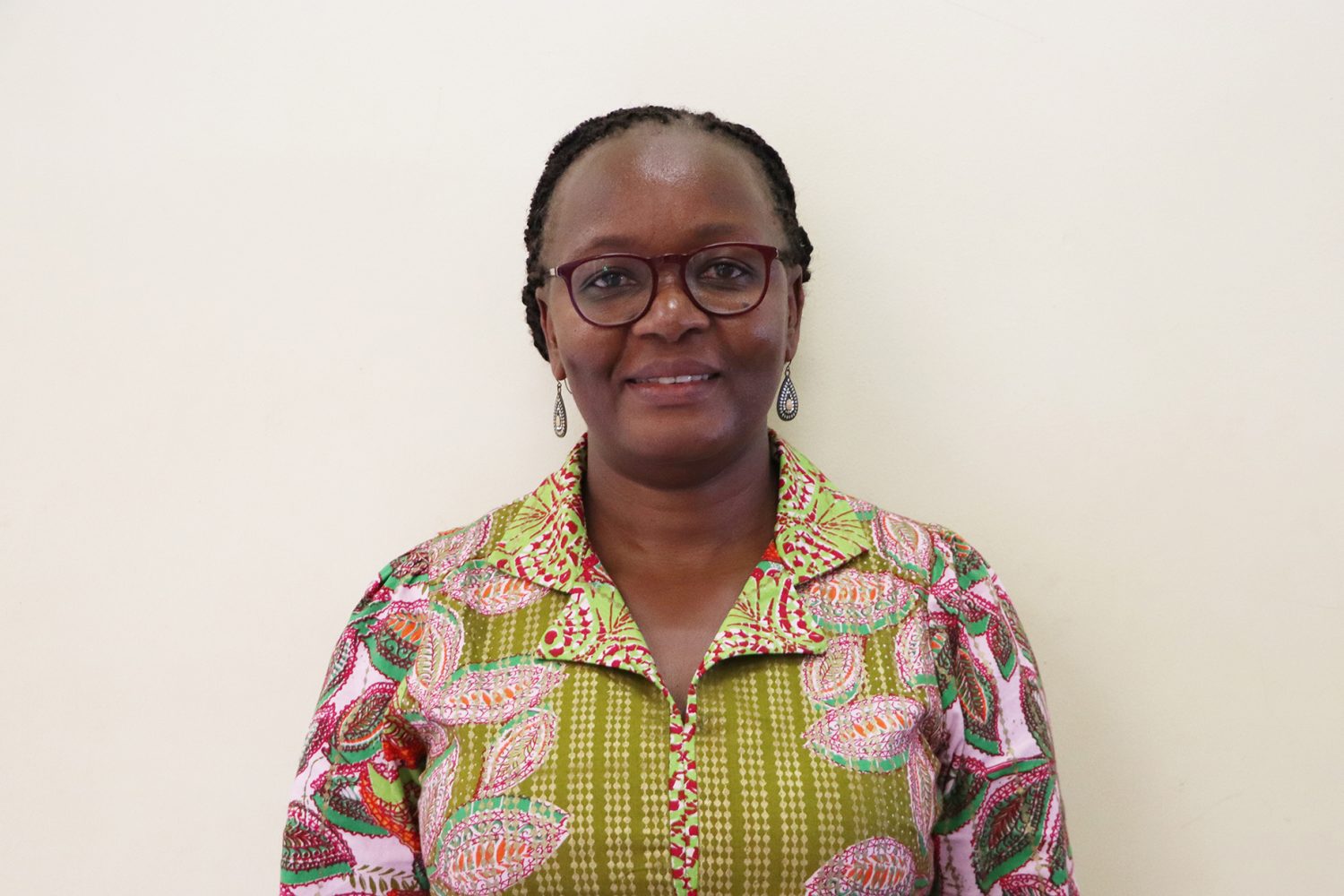
Message to Academic Staff
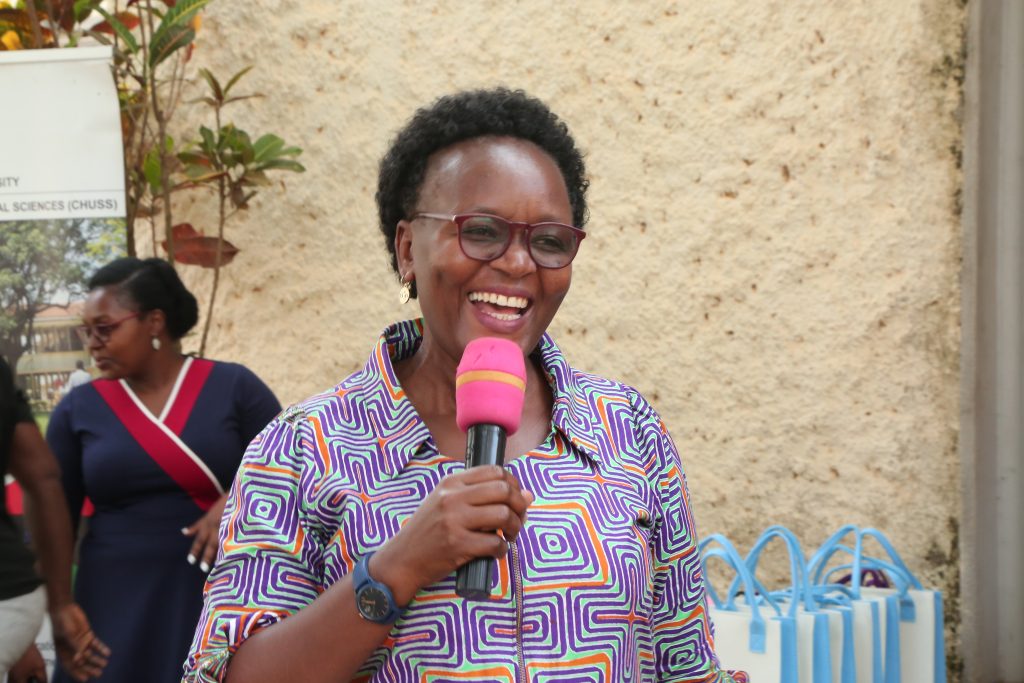
Q: What message do you have for your staff following this achievement?
Dr. Khanakwa:
First, I celebrate my staff and thank them for their dedication to supervision and student support. Academic work is demanding, and material rewards are often limited, but the true satisfaction comes from seeing students succeed.
I encourage my colleagues to remain committed. Yes, the workload is heavy, but many things are possible with dedication and teamwork. Let us continue working for the good of our students, our School, and Makerere University.
Leadership Rooted in Humility
Q: Many colleagues describe you as humble, down to earth, and hardworking. What shapes this character?
Dr. Khanakwa:
I think it is largely my upbringing. My mother was a primary school teacher from the 1950s until the mid-1980s. She worked extremely hard to raise us, combining teaching with farming to ensure we had school fees and basic needs. From her, I learned humility, discipline, and the value of hard work.
I also learned that leadership positions are temporary. You occupy them today, and tomorrow you move on. So humility is essential.
My graduate training also shaped me significantly. My PhD supervisor emphasized that graduate study is a full-time job and that results matter more than noise. Let people see your work through outcomes, not announcements.
Supervision as a Two-Way Commitment
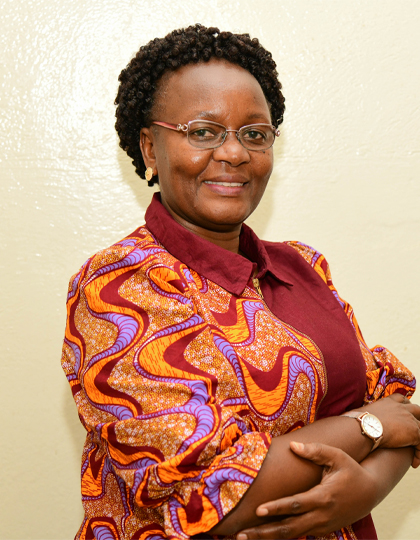
Q: How would you describe your supervision style?
Dr. Khanakwa:
I read my students’ work thoroughly, word by word. Sometimes my comments are tough, but they are honest. Supervision is a two-way commitment. I give feedback, but students must also respond and remain engaged. When that relationship works, progress happens.
Balancing Leadership, Scholarship, and Family
Q: How do you balance being a Dean, scholar, wife, mother, and daughter?
Dr. Khanakwa:
Honestly, I am not sure I balance perfectly. My mother lives far away in Bukwo, so visiting requires careful planning. My children grew up understanding the demands of academic life. I pursued my PhD in the United States and spent long periods away, but we adapted as a family.
Work has become part of my lifestyle. I use weekends to read dissertations, review manuscripts, and write. Sometimes my children ask if I ever sit without working, but this is the commitment I made. As we often say jokingly, “We humbly applied for the job, so let us do the job.”
Scholarship Beyond Supervision
Dr. Khanakwa is also an active scholar and editor. In the past year alone, she has:
- Edited scholarly volumes on archives, memory, method, and pedagogy
- Published a book with Routledge Companion
- Co-authored journal articles and book chapters with graduating students, including Priscah Asiimwe and Anatoli Lwasa Mpijja
“I feel an obligation to write with students,” she notes. “It takes time, energy, and commitment, but it is part of academic mentorship.”
Who Is Dr. Pamela Khanakwa?
Dr. Pamela Khanakwa is the Dean, School of Liberal and Performing Arts, College of Humanities and Social Sciences, Makerere University. She is a seasoned scholar, supervisor, administrator, and mentor whose leadership continues to redefine graduate training excellence. Details about Dr. Pamela Khanakwa can be accessed at: https://chuss.mak.ac.ug/en/personnel/pamela-khanakwa/
More details are available in her attached curriculum vitae.
The CHUSS End- Of-Year-Get-Together
On 12th December, 2025 the college leadership organised a get-together end of year gathering to take stock of the achievements, challenges and brainstorm together on how to move forward. The event was marked by entertainment, team building games, appreciation speeches, sharing a meal and a Christmas package for every staff
Retirees and staff recognised
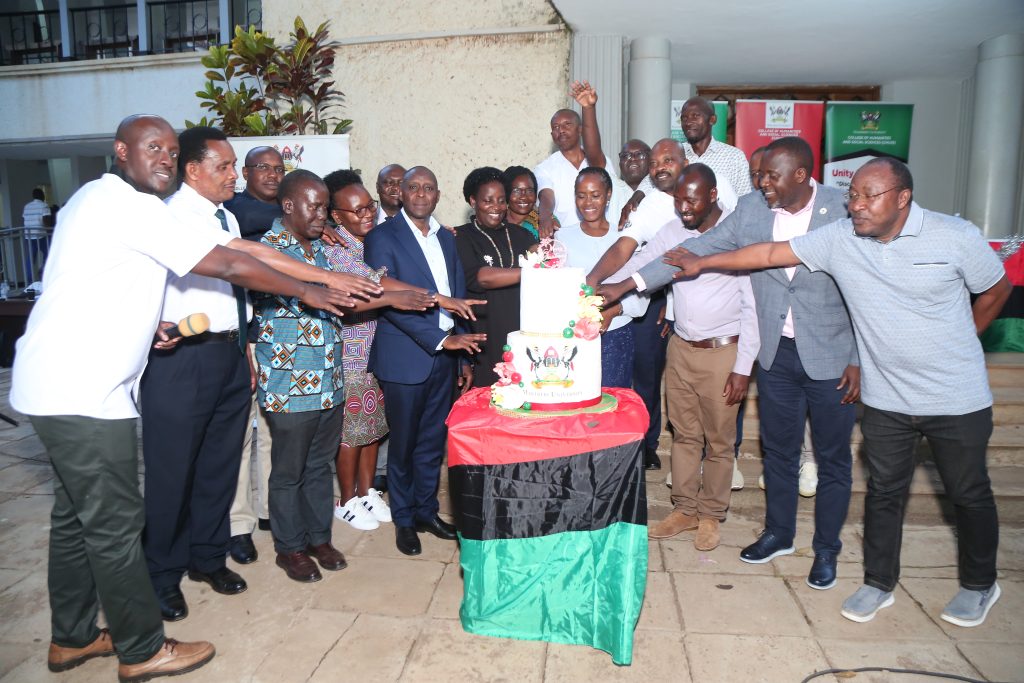
Five retired staff Dr. Micheal Wangotta Masakala, Dr. Anatole Kirigwajjo and Dr. Jackson Kizza Mukas (all from the School of Languages, Literature and Communication), Assoc. Prof. Florence Nansubuga (School of Psychology), Dr. Tusabe Gervase (School of Liberal and Perforing Arts) and Ms. Scovia Nganda Sekweyama (secretary from the School of Social Sciences) were recognised for their dedicated services to the university.
In addition to Dr. Pamela Khanakwa’s Award as Best PhD Supervisor and Dean, Ms. Birabwa Florence scooped the award of Best Registrar of the year. Birabwa is the registrar for the School of Liberal and Performing Arts.
Administrative and support staff including Ms. Mary Gyezaho and Annet Kashumbusha(both administrative secretaries in the Principals office), Farouq Lule (IT Officer), Godfrey Kakooza (cleaner), Charles Sebuguzi (driver) and Jane Anyango (Communications officer) were recognise with awards for outstanding service. Dr. Mohamed Mayanja Kajumba was from the School of Pyschology was recognised as the person with an outstanding talent in Handwriting.
The celebrations held in the Arts quadrangle were graced by the Vice Chancellor Academic Affairs Prof. Sarah Ssali and the Deputy Vice Chancellor in charge of Finance and Adminstration Prof. Ireeta Tumps.
Humanities & Social Sciences
Ugandan Journalists Trained on Peace and Gender-Sensitive Reporting Ahead of 2026 Elections
Published
2 months agoon
January 9, 2026By
Jane Anyango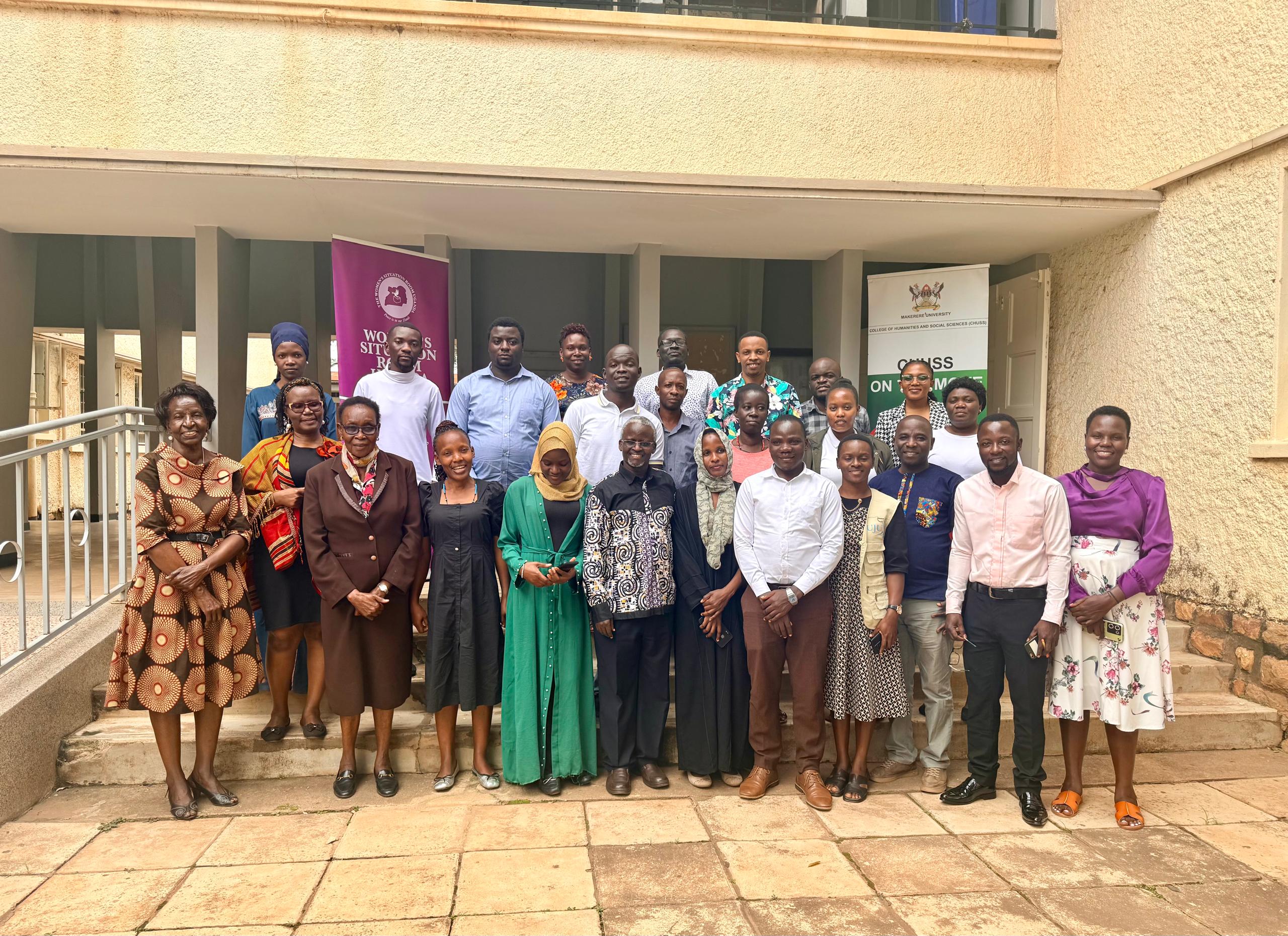
Kampala, Uganda – January 9, 2026
Ahead of the January 15 general elections, Ugandan journalists have undergone specialized training on peace and gender-sensitive reporting to ensure responsible media coverage during the election period. The two-day training, held from 8th to 9th January 2026 at Makerere University’s College of Humanities and Social Sciences Smart Room, was organized by the Women’s Situation Room (WSR) in partnership with various stakeholders and brought together journalists from across print, broadcast, and online platforms.
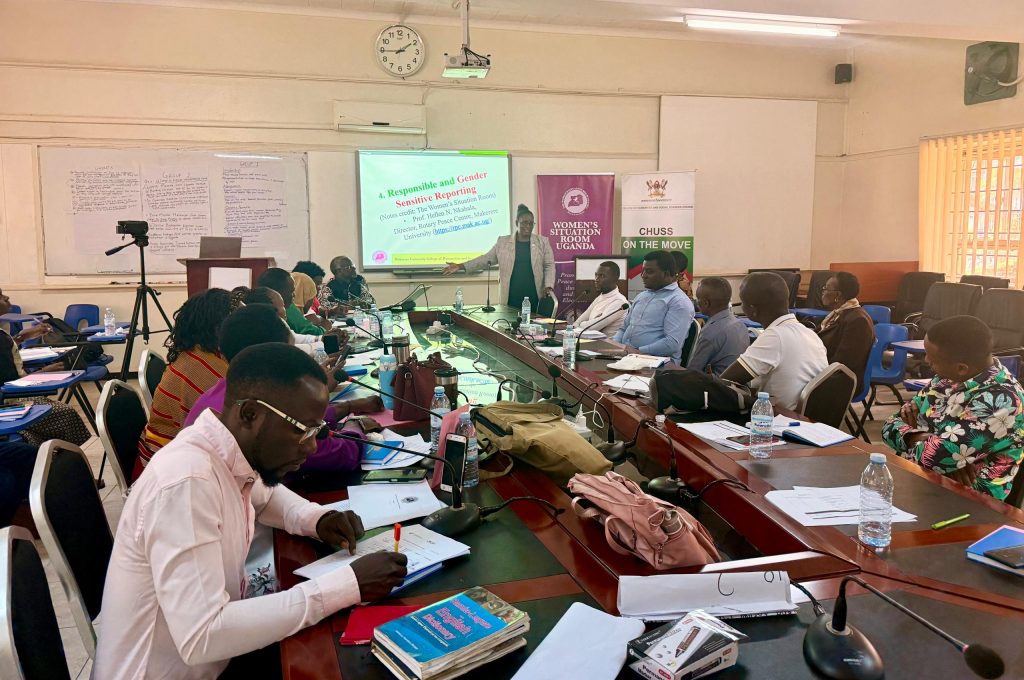
The main objective of the training was to strengthen the capacities of media in reporting and documenting electoral processes in a responsible and gender-sensitive manner. The specific objectives included: strengthening journalists’ skills to cover the 2026 elections in a fair, balanced, gender-sensitive, and non-violent partisan way; enhancing the role of media to enable citizens to be well-informed and actively participate in the election process; ensuring focused and balanced reporting on peace during and after elections; and strengthening partnerships between the WSR and media houses during the election period.
The training covered multiple critical modules. Day one focused on responsible conflict-sensitive reporting, emphasizing principles such as balance, impartiality, and accuracy. Participants explored the role of media as a relayer of the population’s voice, election monitor, catalyst for social cohesion and reconciliation, contributor to the accountability of political actors, and a platform for detecting and debunking digital media misinformation and hate speech.
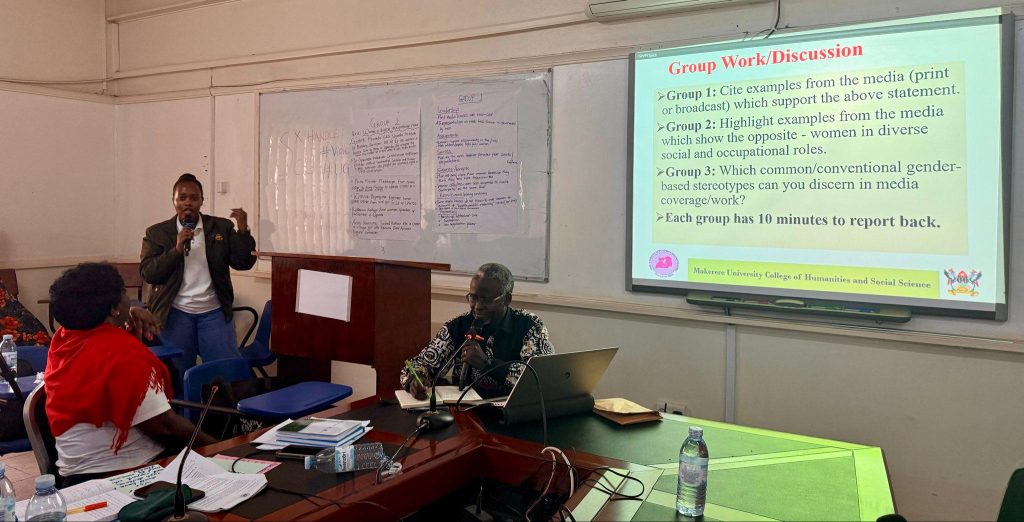
Day two addressed responsible and gender-sensitive reporting. Key aspects included the definition of gender-sensitive reporting, how to become a gender-sensitive reporter, critical elements in reporting with gender awareness, packaging gender-sensitive stories, and a checklist for detecting and avoiding gender-insensitive reporting.
Her Lordship, retired Judge Justice Mary Mayitum, emphasized the importance of peace as the foundation of development and democratic engagement. “Because we value peace more than anything. Without peace, really, you can do nothing. But where there is peace, you can have time to reflect, discuss with others, and join in meaningful dialogue,” she said. She warned that the country’s past conflicts, such as those in Gulu, underscored the necessity of maintaining national harmony.
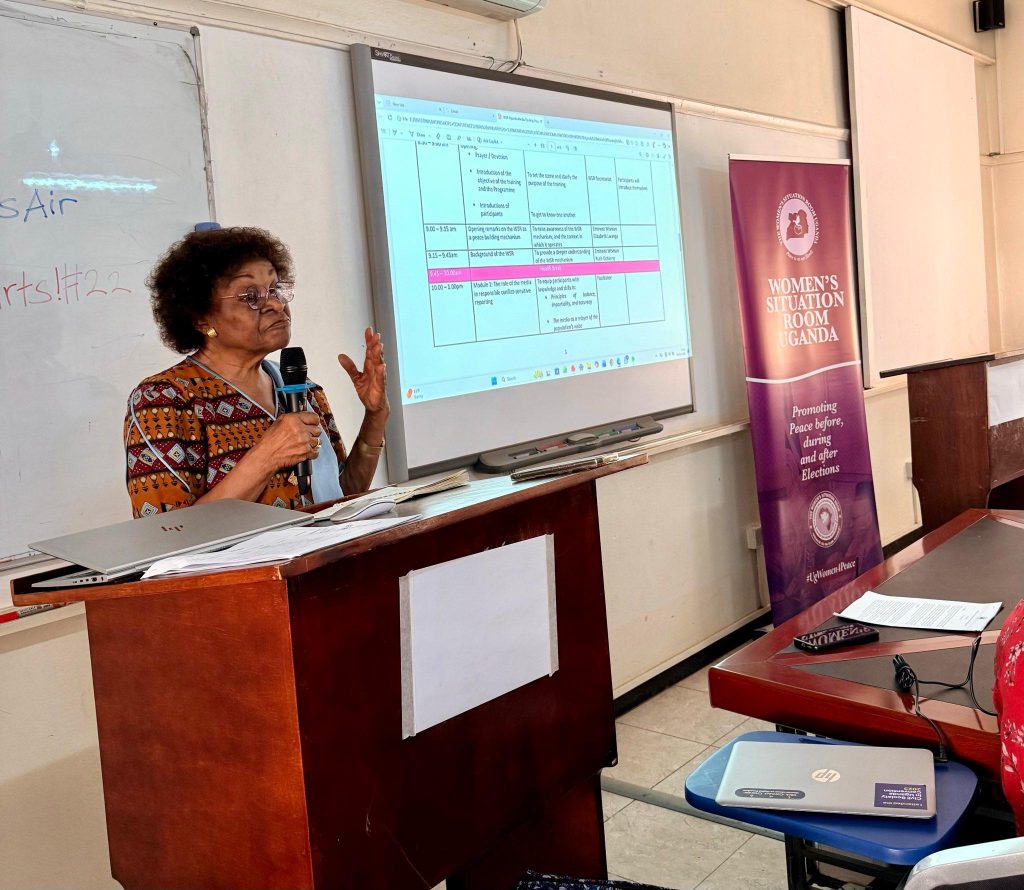
Justice Mayitum also urged other key election stakeholders to uphold peaceful conduct. “Being peaceful is the very heart of life. We have spoken to police, security personnel, political parties, and the Electoral Commission. We want politicians to have a code of conduct and to understand that it’s okay to think differently without fighting or hating one another,” she added.
Dr. William Tayebwa, lead facilitator and senior lecturer in the Department of Journalism and Communication at Makerere University, said, “This training is about conflict-sensitive reporting, peace journalism, and gender-sensitive reporting in the context of the elections. The emphasis was on giving female political candidates a voice while ensuring journalists report responsibly on election-related matters.”
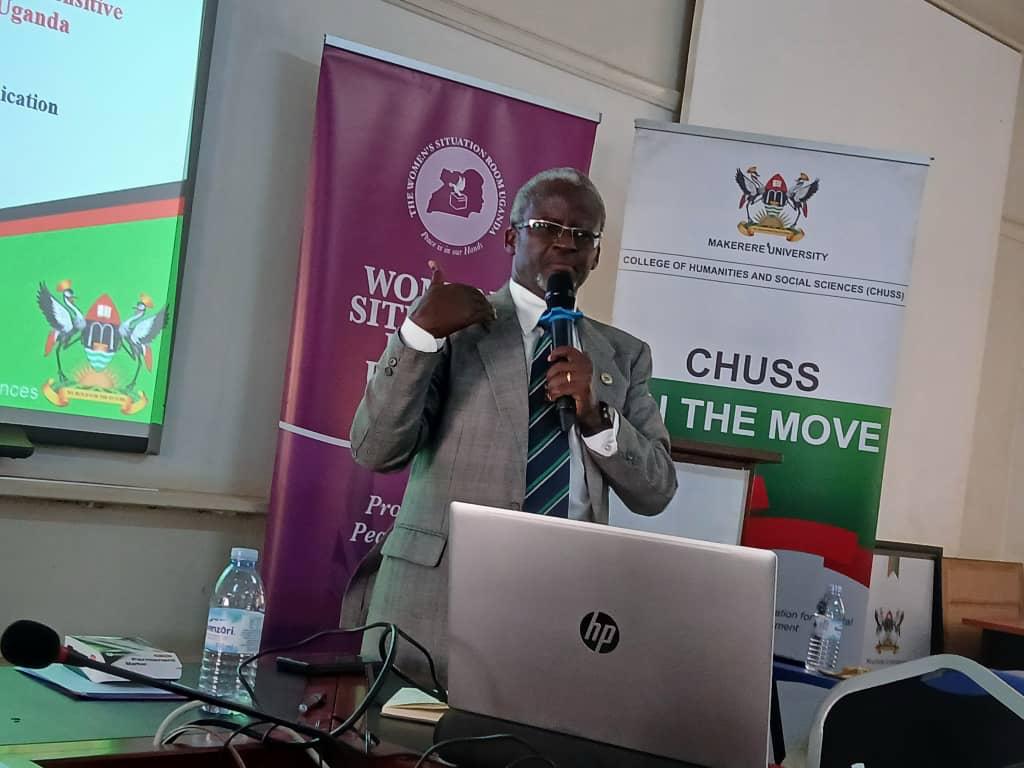
Participants described the training as timely and impactful. Tony Banizengabo of CBS Wakiso District said, “We’ve benefited a lot. We’ve been trained to write stories which bring peace, not conflict. Ahead of the elections, we are very ready to be part of peacemakers.”
Dorcas Kimono of UBC TV Kampala added, “It was so timely and rich. We learned how to report without promoting or fueling violence, giving voice to victims without angering them or encouraging violators. This is very vital, especially as we approach the 2026 elections.”
The training aims to equip media personnel with the knowledge and skills to uphold professional ethics while contributing to a peaceful, inclusive, and gender-sensitive electoral process.
Trending
-

 Humanities & Social Sciences5 days ago
Humanities & Social Sciences5 days agoMeet Najjuka Whitney, The Girl Who Missed Law and Found Her Voice
-

 Health1 week ago
Health1 week agoUganda has until 2030 to end Open Defecation as Ntaro’s PhD Examines Kabale’s Progress
-

 General4 days ago
General4 days ago76th Graduation Highlights
-

 Agriculture & Environment1 week ago
Agriculture & Environment1 week agoUganda Martyrs Namugongo Students Turn Organic Waste into Soap in an Innovative School Project on Sustainable Waste Management
-

 General1 week ago
General1 week agoMastercard Foundation Scholars embrace and honour their rich cultural diversity
